Siri Stafford/Getty Images
Advertiser Disclosure

What to know about prepaid travel credit cards
Prepaid travel cards are one more way to access cash while traveling the globe
Published: December 15, 2022

Author: Allie Johnson

Author: Dan Rafter

Editor: Brady Porche

Reviewer: Kaitlyn Tang
How we Choose
Prepaid travel cards can make it easy to access cash while you’re traveling abroad, but remember that convenience comes with limitations.
The content on this page is accurate as of the posting date; however, some of our partner offers may have expired. Please review our list of best credit cards , or use our CardMatch™ tool to find cards matched to your needs.
Finally ready to take your next international trip? Whether it’s a business meeting in Brussels or a foodie’s tour of Florence, you might consider packing a prepaid travel card for your trip.
Prepaid travel cards let you access cash in your destination’s local currency without the risk of using your debit card. They also let you avoid the high fees of credit card cash advances or the hassles of scrounging up traveler’s checks before you depart.
But, be careful — despite the convenience of prepaid travel cards, they come with their own set of fees and limitations (most notably ATM withdrawal and purchase amount caps that could put a damper on your vacation).
“A prepaid travel card is one tool in a diverse travel wallet,” said Julie Hall, internal communications manager for Hilton Grand Vacations and former public relations manager for AAA, in a previous interview. “It’s one of the most convenient ways to get money while traveling.”
Let’s take a look at everything you need to know about prepaid travel cards — from how they work to the pros and cons of using them for your travels.
- How do prepaid travel cards work?
Prepaid travel cards work much like general-purpose prepaid cards, except that they typically offer special features and perks designed for travel — which can vary based on the issuing bank.
In general, to use a prepaid travel card, you purchase the card and simultaneously load it with the funds you want to spend on your trip, up to the maximum amount allowed on the card. (For example, the PayPal Prepaid Mastercard® , a general prepaid card, allows a maximum balance of $15,000.)
Once you’ve arrived at your destination, you can use your prepaid card to make purchases directly (much like you would with a debit card). You can also use it at an ATM to get cash in that destination’s currency.
Depending on the card issuer, you’ll be able to log in to a mobile app or your online account to check the balance, review your purchases and see any any account charges.
- What are the benefits of a prepaid travel card?
Why not just take cash, your credit cards and your debit card the next time you travel to an international destination? Why would you also take a prepaid credit card?
If you lose your card, thieves only have access to the loaded cash
If a thief gains access to your prepaid card abroad, they’ll only have access to whatever funds are loaded onto the card (unlike debit cards, which can provide thieves access to your bank account, or credit cards, which a thief can charge up to a certain limit).
Further, the network through which a prepaid card is offered may provide a zero liability policy , though, overall, prepaid cards don’t offer the same breadth of protections as debit and credit cards (think chargebacks and fraud alerts).
More convenient than traveler’s checks
Prepaid travel cards also provide more convenience than, say, traveler’s checks (which, yes, still exist). Getting traveler’s checks before you go can be a hassle, and you might also be surprised at how many retailers across the globe no longer accept them. As a result, prepaid cards are often a better option than these paper checks.
- What are the drawbacks of a prepaid travel card?
Like most financial products, prepaid travel cards come with pros and cons. Here are some of the drawbacks of using one:
Foreign transaction fees, among others
Travelers should be wary of the fees connected to prepaid cards, as they can add up to a lot of money during an international trip. Many prepaid cards carry foreign transaction fees. Today, it’s far easier to find credit cards with no foreign transaction fees than to find prepaid cards without them.
Further, prepaid travel cards may also charge a card purchase fee, ATM withdrawal fee, higher foreign ATM withdrawal fee, inactivity fee and a fee to get any remaining balance back by check.
No help for your credit score
If you charge restaurant meals, souvenirs and tickets to a traditional credit card and pay your bill on time, your three-digit credit score will receive a boost. This doesn’t happen with purchases you make with prepaid travel cards, because your prepaid card activity isn’t reported to the national credit bureaus .
If you don’t keep track, you could run out of funds
If you’re used to swiping a credit card without much thought, there’s a chance a prepaid card could leave you high and dry when you go to make a purchase. Just be sure to keep tabs on the amount of money you’ve loaded — and spent — on your card.
Prepaid travel card tips
Prepaid travel cards do come with some potential hurdles. Here are some tips for avoiding the most common downsides of these cards:
- Check the fees associated with your card (or potential card): Prepaid cards can charge fees that existing debit and credit card holders aren’t used to, so it’s important to read the fine print before swiping. For example, the Netspend® Visa® Prepaid Card charges a $5.95 inactivity fee per month after the card has been idle for 90 days.
- Verify the card will work at your destination: Double-check with your issuer that your prepaid card will be accepted where you’re traveling. Even a card that’s designed for international travel might not work in specific locations due to restrictions from U.S. trade sanctions.
- Know the limits: Prepaid travel cards typically have limits that could throw a wrench into your trip if you don’t understand them ahead of time. For example, some cards can have a daily reload limit as low as $500 (or as high as $7,500, in the case of the Netspend Visa card). Again: Be sure to read through your card’s fine print before embarking.
- Avoid holds at all costs: In a sense, prepaid travel cards work like debit cards. Be sure to avoid using a prepaid travel card to reserve a hotel room or a rental car, which can trigger a hold that could tie up hundreds of dollars of your cash for a week or longer. Instead, use a credit card to reserve these items, then use your prepaid card to pay the final charges.
Should you use a travel credit card instead?
If the drawbacks of a prepaid travel card outweigh the benefits, you might be better off signing up for a travel credit card or using one you already have as your primary payment method while traveling.
Travel credit cards almost always have zero fraud liability, which can set your mind at ease in the event your card is lost or stolen . They also let you earn rewards for your spending, and many offer purchase and trip protection and have no foreign transaction fees. Some even offer perks such as access to airport lounges where you can get complimentary food and drink. And, depending on your credit limit, you may have more spending power with a credit card than a prepaid card.
That said, they can also have pitfalls. Not all travel credit cards are accepted in all countries. For example, Visa and Mastercard are widely accepted, while American Express and Discover have a smaller international presence. And, depending on your location, some merchants may require chip-and-pin cards or may not accept payment cards at all.
It’s advisable to carry a few different payment methods with you (credit, debit and prepaid) when traveling, along with some local cash. Also, notify your credit card company about your travel plans, lest they flag your card as stolen and cancel it.
Bottom line
A prepaid travel card doesn’t come without downsides, but if you want an easy way to access cash in your destination’s currency — and want a quick way to pay merchants once you arrive at your international destination — the ease of using them might make your trip a less stressful one.
Editorial Disclaimer
The editorial content on this page is based solely on the objective assessment of our writers and is not driven by advertising dollars. It has not been provided or commissioned by the credit card issuers. However, we may receive compensation when you click on links to products from our partners.
Allie Johnson is an award-winning freelance writer covering personal finance, business and lifestyle. She loves tracking down tips, tricks and cautionary tales about credit cards and money.
Dan Rafter has covered personal finance for more than 15 years for publications ranging from The Washington Post and Chicago Tribune to Wise Bread, HSH.com and MoneyRates.com. His work has also appeared online at the Motley Fool, Fox Business, Huffington Post, Christian Science Monitor and Time.
On this page
- Prepaid travel card perks
- Stick with travel credit card?
Essential reads, delivered straight to your inbox
Stay up-to-date on the latest credit card news 一 from product reviews to credit advice 一 with our newsletter in your inbox twice a week.
By providing my email address, I agree to CreditCards.com’s Privacy Policy
Your credit cards journey is officially underway.
Keep an eye on your inbox—we’ll be sending over your first message soon.
Learn more about Education

Best credit cards for international travel
The best credit cards for international travel can make traversing the globe a more comfortable and rewarding experience. Compare our top picks to see how they work for your travel style and goals.

Best no-annual-fee travel credit cards of 2023
Looking for the best travel rewards with no annual fee doesn’t have to be hard. There are plenty of great credit cards you can explore to help you earn and redeem rewards for travel.
Best credit cards for trip cancellation
10 credit and money tips for travel abroad
TSA PreCheck vs. Global Entry vs. Clear: Which is best for you?
How do travel rewards credit cards work?
Explore more categories
- Card advice
- Credit management
- To Her Credit
Questions or comments?
Editorial corrections policies
CreditCards.com is an independent, advertising-supported comparison service. The offers that appear on this site are from companies from which CreditCards.com receives compensation. This compensation may impact how and where products appear on this site, including, for example, the order in which they may appear within listing categories. Other factors, such as our own proprietary website rules and the likelihood of applicants' credit approval also impact how and where products appear on this site. CreditCards.com does not include the entire universe of available financial or credit offers. CCDC has partnerships with issuers including, but not limited to, American Express, Bank of America, Capital One, Chase, Citi and Discover.
Since 2004, CreditCards.com has worked to break down the barriers that stand between you and your perfect credit card. Our team is made up of diverse individuals with a wide range of expertise and complementary backgrounds. From industry experts to data analysts and, of course, credit card users, we’re well-positioned to give you the best advice and up-to-date information about the credit card universe.
Let’s face it — there’s a lot of jargon and high-level talk in the credit card industry. Our experts have learned the ins and outs of credit card applications and policies so you don’t have to. With tools like CardMatch™ and in-depth advice from our editors, we present you with digestible information so you can make informed financial decisions.
Our top goal is simple: We want to help you narrow down your search so you don’t have to stress about finding your next credit card. Every day, we strive to bring you peace-of-mind as you work toward your financial goals.
A dedicated team of CreditCards.com editors oversees the automated content production process — from ideation to publication. These editors thoroughly edit and fact-check the content, ensuring that the information is accurate, authoritative and helpful to our audience.
Editorial integrity is central to every article we publish. Accuracy, independence and authority remain as key principles of our editorial guidelines. For further information about automated content on CreditCards.com , email Lance Davis, VP of Content, at [email protected] .

Assessing the Value: Are Prepaid Travel Cards Worth It?
Table of Contents
Prepaid travel cards have gained popularity as a financial tool for travelers, but are they truly worth it? If you’re considering using a prepaid travel card for your international adventures, it’s important to weigh the pros and cons to make an informed decision.
Key Takeaways:
- Prepaid travel cards provide convenience and security when accessing cash in a foreign currency.
- They protect your funds if the card is lost or stolen, limiting the thief’s access to the loaded amount.
- Traveler’s checks may not be widely accepted, making prepaid cards a more accessible option.
- However, prepaid cards come with foreign transaction fees and other associated costs.
- Using a prepaid card does not contribute to improving your credit score.
- It’s vital to carefully read the terms and fees before selecting a prepaid card for your travel needs.
- Consider diversifying your payment methods, including a travel credit card, for additional benefits and rewards.
Prepaid travel cards can be a convenient way to access cash in a foreign currency while traveling internationally. They offer the benefit of protecting your funds if the card is lost or stolen, as thieves only have access to the loaded cash on the card. They also provide more convenience than traveler’s checks, which may not be widely accepted. However, there are drawbacks to using prepaid travel cards, such as foreign transaction fees and other fees associated with the card. Additionally, using a prepaid card does not help improve your credit score. It’s important to carefully read the terms and fees associated with the card before using it. Consider using a mix of payment methods, including a travel credit card, which can offer additional benefits and rewards. Ultimately, whether prepaid travel cards are worth it depends on your specific travel needs and preferences.
To learn more about the world of travel, visit Top Travel Topics .
Understanding Prepaid Travel Cards
Before we delve into whether prepaid travel cards are worth it, let’s understand the benefits and drawbacks of using them for your travels. Prepaid travel cards can be a convenient way to access cash in a foreign currency while traveling internationally. They offer the benefit of protecting your funds if the card is lost or stolen, as thieves only have access to the loaded cash on the card. They also provide more convenience than traveler’s checks, which may not be widely accepted.
However, it’s important to be aware of the drawbacks associated with prepaid travel cards. One major consideration is the fees. Many prepaid cards charge foreign transaction fees, which can add up quickly, especially if you make multiple purchases or withdrawals during your trip. Additionally, there may be fees for purchasing or reloading the card, as well as monthly maintenance fees. These fees can eat into your travel budget if you’re not careful.
Another point to consider is that using a prepaid travel card does not help improve your credit score. If building or maintaining good credit is important to you, using a travel credit card may be a better option. Travel credit cards often offer additional benefits and rewards, such as airline miles or hotel points, which can enhance your travel experience. However, it’s always wise to carry a mix of payment methods, including cash and a backup credit card, in case your prepaid travel card is not accepted or encounters any issues.
In conclusion, while prepaid travel cards offer the convenience of accessing cash in foreign currencies and protecting your funds, they do come with fees that should be carefully considered. It’s essential to read the terms and conditions associated with the card and understand the fees involved. Ultimately, whether prepaid travel cards are worth it depends on your specific travel needs and preferences. To explore more in-depth information about prepaid travel cards, you can visit our travel topics page.
Choosing the Best Prepaid Travel Card
Selecting the right prepaid travel card is crucial to ensure you get the most value out of your travel funds. Let’s explore the factors to consider when choosing the best card for you.
1. Fees: When comparing prepaid travel cards, it’s essential to understand the fees associated with each card. Look for cards that have low or no fees for things like initial activation, reloading, ATM withdrawals, and inactivity. Some cards may also charge a monthly maintenance fee, so be sure to factor in these costs when making your decision.
2. Exchange Rates: Another crucial factor to consider is the exchange rate offered by the prepaid travel card. Look for cards that offer competitive exchange rates, as this will impact the amount of foreign currency you can access with your funds. It’s also worth checking if the card locks in the exchange rate at the time of loading or if it fluctuates with the market.
3. Acceptance: Before selecting a prepaid travel card, it’s important to know where it is accepted. Ensure the card is widely accepted at merchants and ATMs in your intended travel destinations. You don’t want to be caught in a situation where the card is not usable, leaving you without access to your funds.
Comparing Prepaid Travel Cards
Remember to carefully review the terms and conditions of each prepaid travel card to ensure it aligns with your travel needs. Consider using a mix of payment methods, such as a travel credit card, to maximize your benefits and rewards. By choosing the best prepaid travel card for your specific needs, you can enjoy a convenient and secure way to access cash while traveling internationally.
Examining Fees and Exchange Rates
A closer look at the fees and exchange rates associated with prepaid travel cards will help us determine whether they are worth the investment. While prepaid travel cards offer the convenience of accessing cash in a foreign currency, it’s important to understand the potential costs involved.
One key consideration is the fees associated with using a prepaid travel card. These fees can vary widely between different cards and can include charges for initial activation, reloading the card, and monthly maintenance. It’s essential to carefully review the fee schedule provided by the card issuer to ensure you are aware of all applicable charges.
In addition to fees, exchange rates can also impact the value of using a prepaid travel card. When you load funds onto a prepaid card, they are converted into the currency of the card. The exchange rate used for this conversion can vary, and some card issuers may offer less favorable rates compared to others. It’s advisable to compare the exchange rates offered by different prepaid travel card providers to ensure you are getting a competitive rate.
It’s also important to note that using a prepaid travel card does not contribute to building credit. Unlike credit cards, prepaid cards do not report your payment history to credit bureaus. So if you’re looking to improve or establish your credit, using a prepaid travel card may not be the best option.
While prepaid travel cards can be a convenient and secure way to carry money while traveling, they may not be the most cost-effective option for everyone. It’s essential to carefully evaluate the fees and exchange rates associated with prepaid cards and compare them to other payment methods, such as travel credit cards, to determine which option best suits your needs and preferences.
By comparing various prepaid travel cards, we can gauge which ones offer the greatest value and benefits for your travel needs. When considering different options, it’s important to assess factors such as fees, exchange rates, and acceptance worldwide. Some prepaid cards may charge higher fees for initial purchase or reloads, while others may have monthly maintenance fees. Additionally, international transaction fees can vary, so it’s crucial to choose a card with favorable rates if you plan on using it frequently during your travels.
Another aspect to consider is the ease of use and accessibility. Look for prepaid cards that offer a user-friendly mobile app or online portal, making it convenient to manage your funds and track your spending. It’s also essential to check if the card is widely accepted at various locations, including ATMs and merchants, especially if you plan to visit remote or less touristy areas.
To help you make an informed decision, we have created a comprehensive comparison table below, outlining the key features and fees of selected prepaid travel cards. Please note that this is not an exhaustive list, and it’s recommended to research additional options based on your specific travel destination and requirements.
Remember, while prepaid travel cards offer convenience and security, they may not be the only payment method you’ll need during your travels. It’s advisable to carry a mix of payment options, including a travel credit card, which can provide additional benefits such as travel insurance coverage and reward points. By comparing different prepaid travel cards, you can find the one that suits your specific needs and provides the most value for your money.
International Travel with Prepaid Cards
Discover how prepaid travel cards can enhance your international travel experience, from avoiding foreign transaction fees to their acceptance worldwide. Prepaid travel cards are a convenient and secure option for accessing cash in a foreign currency while traveling internationally. These cards offer peace of mind in case the card is lost or stolen, as thieves only have access to the loaded cash on the card, protecting your funds. This makes them a safer alternative to carrying large amounts of cash.
One of the key advantages of prepaid travel cards is the ability to avoid foreign transaction fees. When using traditional credit or debit cards, these fees can quickly add up and significantly impact your travel budget. With a prepaid card, you can load it with the desired amount of foreign currency before your trip, eliminating the need to exchange money at airports or local currency exchange locations. This can save you money on fees and provide a more convenient travel experience.
Furthermore, prepaid travel cards are widely accepted worldwide, making them an easy and hassle-free payment method for your international travels. Whether you’re shopping, dining, or withdrawing cash from ATMs, you can use your prepaid travel card just like a regular debit or credit card. It provides a sense of financial security and ensures you can access your funds wherever you go.
Additional Benefits
- Prepaid travel cards can help you budget and control your spending while traveling. You can load a specific amount onto the card and track your expenses online or through mobile banking apps, giving you a clear overview of your spending.
- Some prepaid travel cards offer additional perks such as travel insurance, emergency assistance, and rewards programs. These benefits can further enhance your travel experience and provide added peace of mind.
While prepaid travel cards offer numerous benefits for international travelers, it’s important to carefully read the terms and fees associated with the card before using it. Make sure to compare different prepaid travel cards available in the market, considering factors such as fees, exchange rates, and additional benefits. Additionally, consider using a mix of payment methods, such as a travel credit card, to take advantage of additional rewards and benefits. Ultimately, the value of prepaid travel cards depends on your specific travel needs, preferences, and financial goals.
For more information on international travel, visit our website Top Travel Topics .
The Safety and Security of Prepaid Travel Cards
One of the key advantages of prepaid travel cards is their enhanced safety features, making them a secure option for your travel finances. When you use a prepaid travel card, you don’t need to carry large amounts of cash with you, reducing the risk of loss or theft. If your card is lost or stolen, you can quickly report it and have it blocked to prevent unauthorized access to your funds. This provides peace of mind, knowing that your money is protected.
Furthermore, prepaid travel cards are equipped with PIN codes, just like debit cards, adding an extra layer of security. This ensures that only you can access the funds on your card. In comparison, carrying cash can leave you vulnerable to pickpockets or other unfortunate incidents.
In addition to their safety features, prepaid travel cards are also a great option for budgeting your expenses. You can load a specific amount of money onto the card, allowing you to stick to a predetermined budget while traveling. This can help you avoid overspending and manage your finances more effectively. It’s important to note that prepaid travel cards are not linked to your bank account, so even if your card is compromised, your personal banking information remains protected.
In conclusion, prepaid travel cards offer a secure and convenient way to access money while traveling. Their safety features, such as PIN code protection and the ability to quickly block the card, provide added peace of mind. Additionally, using a prepaid travel card helps you budget your expenses effectively and reduces the need to carry large amounts of cash. Remember to carefully review the terms and fees associated with the card before using it to ensure it meets your specific travel needs. Consider using a mix of payment methods, including a travel credit card, to maximize benefits and rewards. When it comes to protecting your travel finances, prepaid travel cards are a reliable option.
Controlling Spending and Budgeting
Find out how prepaid travel cards empower you to manage your travel budget effectively, providing a valuable tool for controlling your spending. When you’re traveling, it’s easy to get caught up in the excitement and overspend. With a prepaid travel card, you can set a budget and load only the amount you’re willing to spend, helping you avoid unnecessary expenses.
One of the key features of prepaid travel cards is that they allow you to track your expenses easily. Most cards come with an online portal or mobile app where you can monitor your transactions in real-time. This means you can review your spending at any time, ensuring you stay within your budget and have a clear picture of your expenses.
In addition to budgeting, prepaid travel cards offer convenience in managing your spending. Instead of carrying large amounts of cash or relying on credit cards with high foreign transaction fees, you can use your prepaid card to make purchases and withdraw money in local currencies. This can help you avoid unexpected fees and save money while traveling.
By using a prepaid travel card to manage your travel budget, you can make better financial decisions and have a more enjoyable trip. However, it’s essential to compare different prepaid travel cards to find the one that suits your needs. Consider factors such as fees, exchange rates, and acceptance worldwide to ensure you choose the best option.
Remember, a mix of payment methods can be beneficial while traveling. Alongside your prepaid travel card, consider carrying a travel credit card that offers additional benefits, rewards, and protection. With these tools at your disposal, you can have greater control over your spending, enhance your travel experience, and make the most of your financial resources.
After considering the benefits, drawbacks, and specific factors involved, we can now determine whether prepaid travel cards are truly worth using for your travel needs.
Prepaid travel cards can be a convenient way to access cash in a foreign currency while traveling internationally. They offer the benefit of protecting your funds if the card is lost or stolen, as thieves only have access to the loaded cash on the card. They also provide more convenience than traveler’s checks, which may not be widely accepted.
However, there are drawbacks to using prepaid travel cards, such as foreign transaction fees and other fees associated with the card. Additionally, using a prepaid card does not help improve your credit score. It’s important to carefully read the terms and fees associated with the card before using it. Consider using a mix of payment methods, including a travel credit card, which can offer additional benefits and rewards.
To make an informed decision, it’s crucial to assess your specific travel needs and preferences. Some travelers may find that prepaid travel cards offer the right balance of convenience and security, while others may prefer alternative payment methods. Ultimately, whether prepaid travel cards are worth it depends on your individual circumstances and priorities.
Q: Are prepaid travel cards worth it?
A: Prepaid travel cards can be a convenient way to access cash in a foreign currency while traveling internationally. They offer the benefit of protecting your funds if the card is lost or stolen, as thieves only have access to the loaded cash on the card. However, there are drawbacks such as foreign transaction fees and other fees associated with the card. Whether prepaid travel cards are worth it depends on your specific travel needs and preferences.
Q: What are the benefits of prepaid travel cards?
A: Prepaid travel cards offer the convenience of accessing cash in a foreign currency, protection against loss or theft, and wider acceptance than traveler’s checks. They can also help control spending and budgeting while traveling.
Q: What are the drawbacks of using prepaid travel cards?
A: Drawbacks of using prepaid travel cards include foreign transaction fees, other fees associated with the card, and the fact that using a prepaid card does not help improve your credit score. It’s important to carefully read the terms and fees associated with the card before using it.
Q: How do I choose the best prepaid travel card?
A: When choosing a prepaid travel card, consider factors such as fees, exchange rates, and acceptance worldwide. It’s important to compare different cards available in the market and assess their features, fees, and benefits to make an informed decision.
Q: What fees are associated with prepaid travel cards?
A: Prepaid travel cards may have fees such as purchasing fees, reloading fees, and monthly maintenance fees. It’s important to understand and consider these fees before choosing a card.
Q: Can prepaid travel cards be used for international travel?
A: Yes, prepaid travel cards can be used for international travel. They are designed to be used in foreign countries and can be a convenient way to access cash in a foreign currency.
Q: How do prepaid travel cards enhance safety and security?
A: Prepaid travel cards enhance safety and security by protecting your funds if the card is lost or stolen. Thieves can only access the loaded cash on the card, limiting potential losses. They are a safer alternative to carrying cash.
Q: Can prepaid travel cards help control spending while traveling?
A: Yes, prepaid travel cards can help control spending while traveling. They allow you to set budgets and monitor expenses easily, providing a convenient way to manage your travel finances.
A: Whether prepaid travel cards are worth it depends on your specific travel needs and preferences. Consider factors such as convenience, fees, and benefits before deciding if a prepaid travel card is the right choice for you.
About The Author
Timothy Turner
Timothy Turner is a seasoned globetrotter and a passionate travel writer with an insatiable wanderlust. With a backpack full of thrilling adventures and a pen dipped in wanderlust, Timothy brings a unique blend of travel expertise and storytelling to his contributions on TopTravelTopics.com .His articles are a delightful mix of inspiring travel tales, practical tips, and a dash of humor that aims to ignite the adventurous spirit within readers and inspire them to explore the world with an open heart and an open mind. Timothy's mission is to be a companion on every traveler's journey and celebrate the magic of exploration and cultural discovery.With an expertise spanning General Travel Topics , Travel Agent & Services , and Destinations & Experiences , Timothy crafts captivating content that simplifies Travel Logistics and readies you for Travel Preparation . Safety is paramount, and his articles also dives into crucial insights on Travel Safety , ensuring your adventures are both exciting and secure. Join Top Travel Topics , as they unravel a world of wanderlust-inducing wisdom, making your travel journey a seamless blend of excitement and knowledge.
Related Posts

Choosing the Best Pets for People Who Travel: Our Guide

Discover Why You Should Date a Guy Who Travels | Tips & Insights

Can a Felon Travel to Dominican Republic? Insightful Facts.
Leave a reply cancel reply.
Save my name, email, and website in this browser for the next time I comment.
- Today's news
- Reviews and deals
- Climate change
- 2024 election
- Fall allergies
- Health news
- Mental health
- Sexual health
- Family health
- So mini ways
- Unapologetically
- Buying guides
Entertainment
- How to Watch
- My Portfolio
- Latest News
- Stock Market
- Biden Economy
- Stocks: Most Actives
- Stocks: Gainers
- Stocks: Losers
- Trending Tickers
- World Indices
- US Treasury Bonds
- Top Mutual Funds
- Highest Open Interest
- Highest Implied Volatility
- Stock Comparison
- Advanced Charts
- Currency Converter
- Basic Materials
- Communication Services
- Consumer Cyclical
- Consumer Defensive
- Financial Services
- Industrials
- Real Estate
- Mutual Funds
- Credit Cards
- Balance Transfer Cards
- Cash-back Cards
- Rewards Cards
- Travel Cards
- Student Loans
- Personal Loans
- Car Insurance
- Mortgage Calculator
- Morning Brief
- Market Domination
- Market Domination Overtime
- Asking for a Trend
- Opening Bid
- Stocks in Translation
- Lead This Way
- Good Buy or Goodbye?
- Fantasy football
- Pro Pick 'Em
- College Pick 'Em
- Fantasy baseball
- Fantasy hockey
- Fantasy basketball
- Download the app
- Daily fantasy
- Scores and schedules
- GameChannel
- World Baseball Classic
- Premier League
- CONCACAF League
- Champions League
- Motorsports
- Horse racing
- Newsletters
New on Yahoo
- Privacy Dashboard
Yahoo Finance
Prepaid travel cards pros and cons
filo/DigitalVision Vectors/Getty Images
When you pack the essentials for your next big trip, whether it’s a business meeting in Brussels, a food tour of Florence or a volunteer vacation in Venezuela, you may want to consider taking a prepaid travel card.
Prepaid travel cards offer an easy way to get cash in the local currency without the risk of using your own debit card, the cost of a credit card cash advance or the hassle of traveler’s checks. But watch out. That convenience comes with fees and limitations, such ATM withdrawal and purchase amount caps that could put a damper your vacation.
“A prepaid travel card is one tool in a diverse travel wallet,” says Julie Hall, public relations manager for AAA, which offers prepaid travel cards. “It’s one of most convenient ways to get money while traveling.”
How prepaid travel cards work Prepaid travel cards have gained in popularity in the United States only in the past five to 10 years, though they’ve been widely used in Europe for much longer, says Brad Fauss, President and CEO of the Network Branded Prepaid Card Association (NBPCA), a prepaid card industry association.
A prepaid travel card works in a similar way to a general purpose prepaid card, except that it typically offers special features and perks designed for travel, which can vary based on the issuing bank, Fauss says.
In general, to use a prepaid travel card, you purchase the card and simultaneously load the funds you want to spend on your trip, up to the maximum amount allowed on the card. For example, the Travelex Multi-Currency Cash Passport MasterCard allows a maximum balance of $8,500 while AAA’s Visa TravelMoney Card (not available in California, Hawaii or Texas) allows a balance of up to $9,999. Once you’ve arrived at your destination, you can use your card at ATMs to get cash or to make purchases.
If you have a prepaid travel card with a Visa or MasterCard logo, you’re protected by the zero liability policy from those card networks. Depending on the card issuer, you may be able to use a smartphone app or log onto a website to check the balance, review your purchases and look for charges you don’t recognize.
For example, the AAA Visa TravelMoney Card offers a mobile app that helps you track your card transactions on the go, Hall says. “If there’s a fraudulent purchase, you can be alerted to that pretty quickly.”
The pros and cons of prepaid travel cards Think you’ll just take some cash, a credit card and your debit card with you on your next trip abroad? There are two big reasons you might want to take a prepaid travel card instead.
Pros include:
Security. Prepaid cards are safer than using your own debit card. “I almost never travel with my personal debit card,” says Elizabeth Avery, founder of the travel site Solo Trekker 4 U, who has traveled to 66 countries. “It’s linked to your hometown bank, so somebody can steal your entire bank account.” Prepaid cards also are safer than carrying wads of cash, says Rupert Kaufmann, president of the site Dream Travel On Points. “Cash is high risk for theft,” he says.
Travel-friendly features and perks. Travel-specific prepaid cards are designed with globe-trotters in mind. For example, some issuers offer MasterCard Travel Cards that are chip-and-PIN, says Jeff Feuerstein, North American senior vice president of prepaid for MasterCard. Because this technology is the norm in Europe and other parts of the world, having a chip-and-PIN card can make it easier to buy train tickets or other items at unattended kiosks. Also, prepaid travel cards may offer some of the perks usually associated with rewards credit cards. For example, the Visa TravelMoney card from Inova Credit Union offers purchase protection, which covers items bought with your card up to $500 for 90 days from the date of purchase for theft or damage due to accidents, fire and weather. The card also offers travel and emergency assistance, pre-trip planning help, emergency translation services and lost luggage reimbursement up to $250 per trip.
Prepaid travel cards also provide convenience when compared with traveler’s checks, which, yes, still exist. “Travelers checks are almost extinct these days, and it's hard to find places to cash them in some countries,” Kaufmann says.
One big con: fees
Travelers may balk at prepaid cards’ fees. “Check the fine print,” Kaufmann says. Travel cards can have “outrageous fees.”
Foreign transaction fees. Like some credit cards, prepaid travel cards may charge foreign transaction fees. The AAA Visa TravelMoney Card, for example, hits users with a foreign transaction fee of 3 percent for purchases made outside the United States, while the Travelex Multi-Currency Cash Passport Card has a foreign transaction fee of 5.5 percent. Today, it's far easier to find cards with credit cards with no foreign transaction fee .
Other fees. Prepaid travel cards may also charge a card purchase fee, an ATM withdrawal fee, a higher foreign ATM withdrawal fee, an inactivity fee and a fee to get the remaining balance back by check.
To avoid high fees, Kaufmann shops around and uses prepaid cards not marketed specifically as travel cards. For example, he used the American Express Bluebird card, until AmEx in 2016 announced it would remove the ability to withdraw cash from ATMs abroad , he says. He’s now switching to Simple , which offers a Visa that charges a 1 percent foreign transaction fee. That's still a better deal than many travel-specific cards, Kaufmann says.
Prepaid travel card tips Depending on the card you want and where you live, you might have to go to a local AAA office, bank branch or a Travelex location to get the card. MasterCard offers a prepaid travel card locator , as does Visa .
Before you make the trek, check out the details of the cards online. Here are five tips for shopping for and using a prepaid travel card:
- Check the fees. Some travel cards get you coming and going, so read the fine print before you buy. For example, the Inova Visa TravelMoney Card charges a $2 card purchase fee, a $5 international ATM withdrawal fee and a $10 account closure fee. And, in addition to foreign transaction fees, the Travelex card charges a $20 balance refund fee and, after the card hasn’t been used for a year, an inactivity fee of $3 a month. That bothers Kaufmann: “I don't want to pay fees when I'm at home and the card sits in the drawer,” he says.
- Verify that the card will work at your destination. Make sure you’ll be able to use the card where you’re going, Avery says. She once got a prepaid travel card at a drugstore for a volunteer trip to an orphanage in the Dominican Republic. After she opened the card, she found out it couldn’t be used abroad. “It was definitely for U.S. travel,” she says. Even a card that’s designed for international travel might not work in specific locations due to restrictions from U.S. trade sanctions. For example, both the Travelex Cash Passport card and AAA’s Visa TravelMoney won’t work in prohibited countries , which include Ecuador, Indonesia, Kenya, Turkey and Vietnam. After Avery discovered her card wouldn’t work abroad, she had to return to the store and go back and forth with the issuer to get her money back, she says: “All it cost me was time and frustration, but I ended up with no card to use on the trip.”
- Pick a card you can manage with ease. Look for a card that lets you check the balance and view purchases either online or via your smartphone, Kaufmann says. “If you’re in a foreign country and different time zone, calling your bank by phone is difficult and expensive,” he says. Also make sure that you can load your card quickly and easily, for example, by free bank transfer, he says. AAA allows reloading at the original purchase location, at various AAA locations, online and by phone. However, funds may not be available for 48 hours when loaded in the latter two ways. “If you use your card more than expected, you don't want to be stuck with an empty card,” Kaufmann says.
- Know the limits. Prepaid travel cards typically have limits that could throw a wrench into your travels if you don’t understand them ahead of time. For example, the Travelex Cash Passport has a $250 reload minimum and also limits you to loading a maximum of $10,000 in a week and $20,000 in a month. The card also has a $1,000 a day ATM withdrawal limit and a $5,000 purchase cap.
- Avoid holds at all costs. Prepaid travel cards function as debit cards, Fauss says. So avoid using a prepaid travel card to reserve a hotel room or a rental car, which can trigger a hold that could tie up hundreds of dollars of your cash for a week or longer. Use a credit card to reserve and, if you want to, use your prepaid card only to pay the final charges.
Despite the downsides, business and leisure travelers should consider prepaid travel cards, says Avery, who had great luck using one on a recent trip to Portugal. “For a traveler, it just makes so much sense,” she says.
See related: 5 favorite apps to save money while traveling , 11 credit card travel insurance benefits
Most prepaid cards fail to disclose fees
Overcoming 5 merchant barriers to EMV chip cards
Best Prepaid Travel Card for Your Trip (Travel Card Guide)
Prepaid travel cards allow for flexibility in spending foreign currencies abroad. They are becoming increasingly popular among travelers today. Travel cards can be used like a debit or credit card, which can be pre-loaded before leaving your home country. This post aims to enlighten you on what a prepaid travel card is, how to use, and its benefits.

What is a Prepaid Travel Card?
While a traveler’s check may come with more restriction and low exchange rate to deal with, the Prepaid Travel Card offers you a whole lot of advantage. It provides flexible and convenient means of carrying money around at normal rates and no hidden charges. Prepaid Travel cards which are also known as forex cards are typical travel cards that allow one to preload money in local currency and relieves one of credit card costs and the rigors of a traveler’s check. Unlike, credit cards that could land you into an overdraft when paying for goods and services, travel cards come with restriction and offers control to help save money.
How Does a Prepaid Travel Card Work?
A prepaid travel card is known to be a tool in a several travel wallet. This implies it can be used in any country that supports it. They have indeed gained a range of popularity with their use for a long while now. The way the card works is similar to your general debit and credit card. This is how it works;
• You start by registering with a prepaid card company and purchase a travel card. • You can then load some cash you need for your trip up to the allowed maximum amount simultaneously. • You can then use the cards for your transactions once you get to your point of destination. • Depending on the type of card company, you might have a mobile app that allows you to keep track of your transactions. • Once you finish your balance, you could reload via the smartphone app feature, or through a text message so far you have money in your bank account. • Even when you misplace it, you could contact the provider for card blocking.
Why Use One While Traveling?

A prepaid card offers the best way to budget and secure money on a trip. Here are some other reasons you need one today;
• It allows locking of exchange rate while traveling: Most times, exchange rates do fluctuate and could be irregular. Hence you risk losing some cash. However, the use of a prepaid travel card allows you to monitor your spending and determine the amount you let out with ease. • Loads multiple currencies: The travel card is a foreign exchange card that allows you to have up to a maximum of 10 different currencies for more flexibility. • Easy to reload feature: Once your balance finishes up, you can easily reload via your mobile through a text, online or through an online mobile app (provided there is money in your bank account). • Guarantees safety with Cash: If the card is perhaps stolen or misplaced, you can easily contact the card company to have it blocked. There are card companies that will offer you some cash to for upkeep during an emergency before returning home.
However, all the conveniences offered through the use of the travel card also comes with some cons such as: • Some prepaid cards charge on reloading fees. • It comes with the peak of transaction fee up to 3%.
Is it Safe to Use a Prepaid Travel Card?
Having a prepaid travel card minimize keeping of foreign cash on you. You could either lose the money at hand through pick-pockets or misplace it. However, the use of a prepaid travel card offers a load of issuance when it comes to money safety. Once you lose or misplace your prepaid travel card, you can contact the card’s company at once to have it blocked. Using a Prepaid Travel Card is a secure way of keeping the money for foreign trips as you can securely use for ATM withdrawals and shopping at foreign marts.
As a traveler who wants to explore the world, you gain a lot with the use of the Prepaid Travel card. It comes with useful peeks of safety, budget, and multi-currency feature. Therefore, instead of using a credit card which could land you into an overdraft. Securely preload your money into the card and control your money while still enjoying your holiday trips.
You are here
Travel hacks: the benefits of a prepaid travel card.
When planning an international holiday, there are a few things that often get left until the last minute or put in the 'too hard basket' for future you to deal with. One of them is packing your bags, but everyone knows you pack best under pressure with only 30 minutes before you leave for your flight. The other is understanding and purchasing your foreign currency for the holiday. Yikes.
We know that tracking exchange rates and figuring out the best way to divide and carry your travel money can be pretty daunting, not to mention confusing. While sorting out your foreign exchange certainly isn't the sexiest part of your holiday (or is it?), it is by far one of the most important (yes, it is). At school it was no hat, no play; overseas it's no cash, no holiday. Simple.
We've got you covered when it comes to understanding currency fluctuations, with plenty of information on exchange rate forecasting for all the major currencies.
With that out of the way, let's have a chat about how to carry your cash, and why a prepaid travel card like the Travel Money Oz Currency Pass is your best bet when it comes to using foreign currency overseas.

Prepaid travel cards are separate to your bank and are specifically built for travellers. Just like your regular card, they can be tapped, swiped and inserted with pin protection to ensure you have access to your money when you need it. There are quite a few available across the market, but we're here to toot our own horn and explain why the Currency Pass is perhaps the snazziest (read: best) of all the options.
Don't just take our word for it, though. Check out all of the benefits you can take advantage of after getting a Currency Pass in your hot little hands.
Avoid those pesky currency conversion fees
When you use your bank card overseas, you could be charged a fee every time you transact because you are essentially spending Aussie dollars. The Currency Pass is already loaded with your preferred currency, so you don't have to account for the extra fees.
No inactivity fees while you’re planning your next trip
Spend less than you expected overseas and arrived home with cash left on your card? Don't stress; it won't get eaten up by inactivity fees and will still be there ready to use on your next holiday.
24hour emergency assist
In the event of an emergency, know that you can always contact our team to ensure your money is safe and accessible. If your card has been lost or stolen, you can access your funds through a cash out at any Western Union as well. That way you won’t be left high and dry. We’ve got a page dedicated to numbers you can call if you’re in trouble, so be sure to save it to your favourites for easy access.
Easy card block and unblock, for when your card falls into the Grand Canyon
If your card gets misplaced or stolen, you can easily block and unblock it via the online portal or app. This process is instant as well, so you don’t have to worry about any annoying delays.
MIC_TMG_CBA_Currency-Pass-RTW-blog_770x500_C_v1.jpg

Lock in your exchange rate when the Aussie dollar is doing well
Lock in your exchange rate the day you load your card*. In other words, if the Aussie dollar is riding high, you can load up your Currency Pass and take advantage of the bonza rate the whole time you are on holiday.
Track your spending (and shopping) in the app
The Travel Money Oz app also allows you to track your spending and check your balance on the go. Knowledge is power, right?
Load up to ten currencies for all of your intrepid adventures
Planning a trip where you'll need a few currencies? No stress, you can load up to 10* currencies onto you Currency Pass including USD, GBP, EUR, NZD, CAD, HKD, JPY, SGD, THB and AUD. Better yet, when you're in the country it will automatically know which currency to use, e.g. it will withdraw GBP when you're paying for a pint in a London pub, and euro's when you're indulging in a croissant or six in Paris.
Use it globally, any country, any time
The Currency Pass is accepted wherever Mastercard is, and Mastercard is accepted pretty much everywhere.
It isn't linked to your life savings or bank account
If your card falls into the wrong hands you can rest assured knowing they won't have access to your bank account and funds at home, nor will they know any personal information apart from the name on the card.
Easy reload on app or portal, for when you forget about the budget and splurge on an extra round of mojitos
You can reload anywhere at any time via bank transfer, debit/credit card or BPAY on our app or online portal. Just keep in mind BPAY can take up to four business days to have the funds accessible in your account, so don't leave reloading until the last minute.
MIC_TMG_CBA_Currency-Pass-RTW-blog_770x500_D_v1.jpg
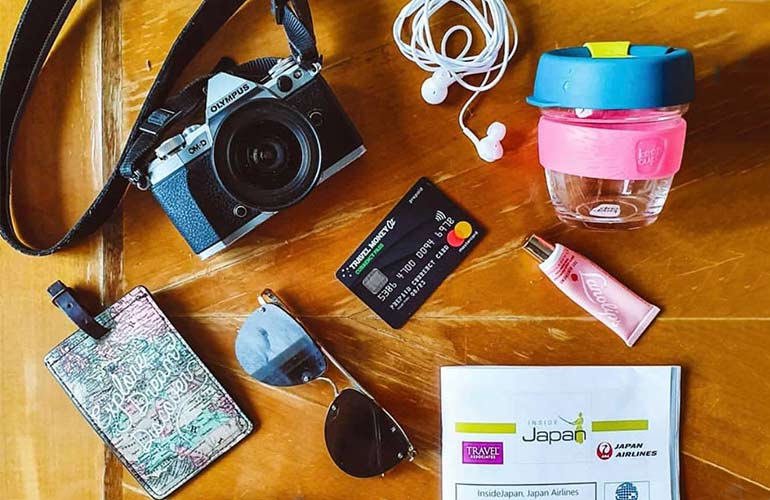
Travel light and avoid carrying around cash
This one is pretty simple - cash has a higher risk of theft. While many countries are still cash-based societies, you don't want to be taking huge wads of it overseas.
When travelling, we recommend you take a mixed wallet. We want to ensure you are prepared for every situation by having a mix of currency options available. This will vary from country to country, but your best bet is to aim for the following combination:
- 60% of your budget available on a Currency Pass
- 40% of your budget converted to cash
- Credit card handy for emergencies and hotel and car hire pre-authorisation or bonds.
Like all of the best things in life, the card is free to get with no monthly fees
The card itself is free and only has a minimum load of $20. That $20 is your own money to spend as well.
You're spending your own money which means no nasty homecoming bills
Your money, your way. Before travelling, you can pre-load the card and reload on holiday when necessary - no credit, no overdraft. This makes it easier for you to budget and takes away the stress off coming home to a huge credit card bill.
Set rate alerts to stay on top of currency movements
You can set rate alerts for your preferred currency on the Travel Money Oz portal. Let us know what your ideal rate is, and we'll let you know if and when it hits. From there you can load funds on your card and lock in the great rate.
Designed for travellers like me and you
If the above points haven't already made it obvious, prepaid travel cards are designed for travelling. Using a Currency Pass will also unlock a wide variety of Priceless ® experiences with Mastercard. Care for a pub tour in London, helicopter ride in Paris or discounted tickets to a Vegas show? Priceless has got you covered.
Sound good? You can purchase your Currency Pass online or in any of our 150+ stores across Australia. Don't forget to grab your cash as well!
Before leaving, it's also worth wising up on some Currency Pass tips and tricks to ensure you are making the most of your travel money overseas.
TMG_CBA_Find a store_New Banner_V3a.jpg

Abbie Taylor

Abbie has three loves: travel, the tiny bread rolls on planes and corgis. She has visited 23 countries and collected an embarrassing tan line in each. When she isn't travelling, carb-loading or corgi spotting, you can find her writing about everything and anything (so she can afford to travel more). @abbieisabelle13
AUD News: Aussie dollar at three-month high as Brexit is delayed again
The honest south-east asia travel guide, more like this.

- Beach Vacations
- For Single Guy
- Things To Do
- Restaurants USA

The Best Prepaid Card For Traveling In Europe – What To Look Out For
For those of us who want to travel in Europe but are concerned about the costs, what is the best prepaid card for traveling in Europe? In this article, we’ll look at the advantages of using a prepaid card, discuss what features to look out for when choosing one and also provide you with some of the top recommended options.
What is a Prepaid Travel Card?
If you want to travel in Europe, then a prepaid travel card is a great option. You can load money onto the card in advance, and then use it to pay for expenses while you are on your trip. This can help you to stick to a budget, and avoid overspending.
There are a few things that you need to look out for when choosing a prepaid travel card. Firstly, make sure that the card is accepted in the country or countries that you plan to visit. Secondly, check the fees associated with the card. Some cards charge transaction fees, foreign currency conversion fees, or ATM withdrawal fees. These fees can add up, so it’s important to choose a card that has low fees. Finally, consider the exchange rate that the card offers. Some cards have better exchange rates than others, so this is something to keep in mind if you want to get the most bang for your buck.
Now that you know what to look for in a prepaid travel card, do some research and find one that meets your needs. Then pack your bags and enjoy your European adventure .
Benefits of Using a Prepaid Travel Card
There are a number of benefits of using a prepaid travel card when traveling in Europe. Firstly, it can help to budget your spending as you can load the card with a set amount of money before you go away. This means that you won’t be able to overspend while you’re on holiday. Secondly, a prepaid card can offer better exchange rates than using your regular debit or credit card. This is because the exchange rate is locked in when you load money onto the card, so you don’t have to worry about fluctuating rates. Finally, some prepaid cards come with added benefits such as travel insurance, cashback or rewards points. This means that you could save money on your travels by using a prepaid card.
What to Look Out For When Choosing a Prepaid Travel Card
When choosing a prepaid travel card, there are a few things to look out for in order to ensure that you’re getting the best deal possible. Below are some tips to help you choose the best prepaid travel card for your needs:
- Compare several different cards before deciding on one. This will help you find the best deal and ensure that you’re getting the features that you need.
- Make sure that the card doesn’t have any hidden fees or charges. Read the small print carefully so that you know exactly what you’re paying for.
- Choose a card with a good exchange rate. This will save you money when converting your currency.
- Look for a card that offers additional benefits such as cash back or rewards points. These can be really useful if you use your card frequently.
The Top 3 Prepaid Travel Cards for Traveling in Europe
As the world becomes increasingly digitized, cash is becoming less and less common. This is especially true when traveling, as many places (especially in Europe) are now cashless. This is where prepaid travel cards come in handy, as they can be used anywhere that accepts Visa or Mastercard. When choosing a prepaid travel card, there are a few things you should look out for:
- Fees : Many prepaid travel cards come with hidden fees, so be sure to read the fine print before signing up.
- Exchange rates : Different cards will have different exchange rates, so it’s important to compare before you choose.
- ATM withdrawals : Some cards charge extra for ATM withdrawals, so if you think you’ll need to take cash out often, be sure to find a card that doesn’t penalize you for doing so.
With that in mind, here are three of the best prepaid travel cards for traveling in Europe:
- The Revolut Card : The Revolut card is one of the most popular prepaid travel cards on the market. It has no fees whatsoever and offers excellent exchange rates. You can also withdraw cash from ATMs without any extra charges.
- The WeSwap Card : The WeSwap card also has no fees and offers competitive exchange rates. However, it does charge £1.50 for ATM withdrawals (although this is still cheaper than most other cards).
- The FairFX Card : FairFX Card is one of the best prepaid cards for traveling in Europe as it offers a number of benefits and features that can be extremely useful for travelers. For example, the card comes with no monthly fees, so you can use it as much or as little as you like without having to worry about any charges. In addition, the card also offers free withdrawals from ATMs across the UK and Europe, which can save you a lot of money if you frequently need to take out cash while traveling. Finally, the card also offers great exchange rates, so you can make sure you’re getting the best value for your money when converting currencies.
How to Get Started With the Best Prepaid Travel Card
If you’re planning a trip to Europe, one of the first things you’ll need to do is figure out what kind of travel money card is best for you. Prepaid travel cards are becoming increasingly popular as they offer a convenient and safe way to manage your money while abroad.
When choosing a prepaid travel card, there are a few things you should keep in mind. First, make sure the card is accepted in the countries you’ll be visiting. Second, compare Fees and Exchange Rates from different providers to find the best deal. And finally, check that the card offers features that will be useful to you such as ATM withdrawals, emergency cash assistance, and online account management.
To get started using a prepaid travel card, simply load it with funds from your bank account or credit card and then use it like a debit card for purchases and ATM withdrawals while abroad. When you’re finished traveling, just empty any remaining balance on the card back into your bank account.
How to Use a Prepaid Debit Card Abroad
If you’re planning a trip to Europe, you may be wondering if it’s best to use a prepaid debit card. There are a few things you should consider when deciding if a prepaid debit card is right for you.
First, what is a prepaid debit card? A prepaid debit card is a card that you load money onto before you use it. This is different from a traditional debit or credit card, which allows you to spend money that you already have in your account.
There are a few benefits of using a prepaid debit card while traveling abroad. First, it can help you avoid fees associated with foreign transactions. Second, it can help you manage your spending more easily since you load only the amount of money you need onto the card. Finally, some prepaid debit cards offer rewards or cash back on purchases made overseas.
Now that you know some of the benefits of using a prepaid debit card abroad, here are a few things to keep in mind when choosing one:
- Make sure the card doesn’t have any hidden fees. Some cards will charge fees for things like ATM withdrawals or currency conversion. Read the fine print so you know exactly what fees will be charged and when.
- Choose a card that has low (or no) foreign transaction fees . If your card charges foreign transaction fees, you’ll lose out on some of the benefits of using a prepaid debit card while traveling. Look for a
Final Thoughts
Prepaid cards are a great way to ensure that you can stay on top of your finances while traveling in Europe. After all, they provide an additional layer of security, convenience and flexibility when it comes to managing your money abroad. By researching the different options available, finding out the fees associated with each card and comparing the features offered by providers, you should be able to find a prepaid card suitable for your needs. Ultimately though, regardless of which one you choose, using a prepaid card is sure to save you time and hassle when traveling overseas.

About author
Samantha hill, related posts, walking trails nearby: your guide to some usa outdoor exploration.
Discover the Best Golf Bag for Travel: Your Ultimate Guide to Tee Off Anywhere
Discover the top choice: unveiling the best garment bag for travel in 2023, discover the best travel electric toothbrush for a brilliant smile on the go, sign up for our newsletter and stay informed.
Enter your email address below to subscribe to my newsletter
Something Fresh
Uncover the hidden gems of nightlife in copenhagen, lagos nightlife unleashed: exploring nigeria's unforgettable after-dark spots, singapore nightlife for singles: your ultimate guide, what people reading, 10 best beaches to visit in november for a blissful getaway, 7 epic vacations for single men over 40 to re-energize and have fun.
Unleashing the Best All-Inclusive Resorts for Singles Over 40
Thailand vacation for single guys: a comprehensive guide, how to spend an unforgettable vacation in bangkok as a single man.
- Terms of Service
- Privacy Policy

MASTERCARD BENEFIT INQUIRIES
Within the U.S.: 1-800-Mastercard (1-800-627-8372) | Outside the U.S.: Mastercard Global Service Phone Numbers
Availability of insurance benefits on your card may vary by card issuer. Please refer to your issuing financial institution for complete insurance benefit coverage terms, conditions and exclusions.
*Card registration required. Certain exceptions apply. Click here for terms and conditions .
†Requirements may vary. See card packaging for details or contact card issuer.
- Travel Podcast
- Work with Travel Experta

- Travel Tips
- Central America
- El Salvador
- United States
- Who is Marina ‘Travel Experta’
- Work With Marina ‘Travel Experta’
How Prepaid Travel Cards Can Save You Up to Thousands in Fees VS Your Regular Debit Card

Planning a dream vacation abroad? While getting regular debit cards is convenient for daily use, they can rack up excessive fees when travelling internationally. That’s why prepaid travel cards can save you a bundle in foreign transactions and ATM fees.
This blog will explain how you can save money using prepaid cards for your next overseas adventure.
Table of Contents
What is a Prepaid Travel Card?
A prepaid travel card lets you load funds in advance to spend overseas. It works like a debit card, except it’s preloaded with foreign currency instead of drawing funds directly from your bank account.
Prepaid travel cards offer many protections that regular cards don’t. They provide:
- Set exchange rates: Load your card upfront to lock in that day’s rates, protecting you from fluctuations later.
- No foreign transaction fees: Most forex cards don’t charge this 1-3% fee like typical cards.
- Low ATM withdrawal fees: Prepaid cards offer huge savings on overseas cash withdrawals.

Who Should Use a Prepaid Travel Card?
Prepaid travel cards provide the best value for certain types of overseas travellers:
- Frequent international travellers: If you travel abroad often, the savings from prepaid card exchange rates and lack of foreign fees are substantial. When factoring in the high and rising cost of living in the UK for frequent travellers, the savings are especially significant.
- Travellers on a budget: For backpackers and budget travellers, saving on fees makes funds stretch further.
- Group/family travellers: Multiplying the fee savings is significant for trips with many people.
- Travellers going to multiple countries: Switching between currencies is easier with prepaid cards.
- Those making big purchases abroad: Buying expensive items internationally can mean thousands in regular card fees.
📖 Recommended Reading: If you’re looking for more useful information, check out Are Travel Rewards Credit Cards Worth It?
What is a Debit Card?
In contrast to prepaid cards, debit cards give more flexibility for daily domestic spending. They deduct purchases directly from your checking account.
While traditional banks don’t charge debit card annual fees, they impose many other charges.
Who Should Use Debit Cards?
Ideal debit card users include:
- Infrequent international travellers: If you hardly travel overseas, paying some fees is manageable.
- Travellers making short/quick trips: For quick weekend trips, prepaid card exchange rate benefits have less impact.
- Those needing card-linked benefits: Some debit card perks like cash back can outweigh foreign transaction fees.
- Domestic travellers: Debit cards lack international fees for travel within your country.
How prepaid cards can help international students
International students studying overseas can also benefit from using prepaid travel cards. When studying in popular destinations like the UK, costs of living and tuition can be high. Prepaid cards help students stick to budgets for expenses like meeting the requirements for UK student Visa . The UK student visa has substantial eligibility requirements, including showing sufficient funds to cover costs.

Prepaid Cards Can Save You Hundreds in Fees
To demonstrate exactly how much prepaid travel cards save over debit cards, let’s compare fees on a two-week, multi-country European vacation for one traveller:
- Destinations: France, Italy, Germany
- Spending: $100 (INR 8343.03)/day x 14 days = $1,400 (INR 116802.49)
- ATM withdrawals: $200 (INR 16686.07) x 4 times = $800 (INR 66744.28)
With a typical debit card:
- Foreign transaction fees: 3% of $2,200 (INR 183546.77) = $66 (INR 5506.40)
- International ATM fees: $5 (INR 417.15) x 4 (INR 333.72) = $20 (INR 1668.61)
- Total fees paid = $86 (INR 7175.01)
With a prepaid travel card:
- No foreign transaction or international ATM fees
- Only reload fees: ~$1 (INR 83.43) per reload x 2 (INR 166.86) = ~$2 (INR 166.86)
- Total fees paid = ~$2 (INR 166.86)
Note: These figures are approximate and do not reflect the actual cost
As you can see, the savings from using a prepaid Forex card is around $84 (INR 7008.15), just on a two-week Europe trip. Extend your travels for a month or more, add more destinations, and multiply by family members; savings can easily surpass $300(INR 25029.10)-$500(INR 41715.18) in avoided fees.
Start Saving Today With Prepaid
Opt for fee-free forex cards instead of lining bank pockets with exorbitant international debit card fees. Protect yourself from foreign transaction fees, get excellent exchange rates, and save hugely on worldwide adventures.
Research top recommended prepaid travel cards that best fit your specific destinations. Many provide bonuses like insurance coverage, global WiFi access, and more.
Disclosure: This blog post may contain affiliate links, which means that I may receive a commission for any purchases made through the links. Your trust is important to us, and we ensure that all products or services we recommend meet or exceed our editorial standards .
Last Updated on January 4, 2024

Need more? Try these
- THINGS TO DO BEFORE VISITING VIETNAM
- Eight Activities in the Smokies that Will Give You an Adrenaline Rush
- The Unwind Weekend: 9 Tips for a Relaxing Family Getaway
- Discover the Advantages of Local Window Replacement
- Discover the Advantages of House Cleaning Services
Leave a Reply Cancel reply
Your email address will not be published. Required fields are marked *
This site uses Akismet to reduce spam. Learn how your comment data is processed .

Make Every Day an Adventure Get your 365 days of Adventure List FREE And Start Living them NOW!
- WORK WITH ME
- Make Every Day an Adventure
LET´S BE FRIENDS

Travel credit cards vs. prepaid travel cards - what’s the difference?
On this page:, how does a travel credit card work, what are the pros and cons of a travel credit card, how does a prepaid travel card work, what are the pros and cons of a prepaid travel card, should i choose a travel credit card or a prepaid travel card, what are my other options for travel money.

As exciting as it is to head on holidays, planning can be prone to stresses of its own. One of the many choices you’ll have to make is how to finance your trip.
We’re here to help you sort out the differences between a travel credit card and a prepaid travel card - two very similarly named things with a whole lot of differences.
The main difference between the two is that a travel credit card uses borrowed money, paid off in monthly instalments. This could be a great option if you need some more flexibility with your money. Meanwhile, a prepaid travel card is preloaded with your money, converted into the required currency. As these are prepaid, these cards work best with a set budget.
Of course, there are pros and cons to each method of payment. To help you navigate which method of payment is the right one for you, we’ve taken a deeper dive into the details.
When you use a travel credit card, you are borrowing money.
This takes away some of the stress of travel, as paying back your expenses is saved until a monthly statement comes through. It also means that not paying off your card will have an impact on your credit score and future borrowing power.
If you pay off your instalments in full, you won’t have to worry about the interest rate charged on top of your purchases. Otherwise, you could find yourself with quite the bill.
Travel credit cards are designed to be used overseas. This means that they might focus on a low foreign exchange margin, aiming to keep expenses low when converted back to Aussie dollars. You might also find a welcome focus on travel features, like travel insurance, airport lounge access, and connections with hotels and car rental companies.
- Pro: Flexibility. Since you haven’t got a set amount to spend beyond your own budget, a travel credit card places less limits on you as you spend overseas.
- Con: High interest rates. If you’re spending sensibly and can pay back your instalments on time and in full, you’ll be lucky enough to avoid interest. Otherwise, credit cards built for travel can have fairly high interest rates that go with their benefits.
- Pro: Travel rewards. A lot of the benefits of a travel credit card come in the form of rewards. When you’re travelling, you’ll see the return on having access to airport lounges, and you’ll be able to use the perks afforded by a good rewards system (flight and hotel upgrades, Frequent Flyer miles, and more).
- Con: High fees. Not every card is the same, so be on the lookout for the fees that come with travel credit cards. Make sure you look into the annual fees and late fees on a card, as often these can be high to keep international spending fees manageable.
- Pro: Low international fees. As opposed to using your normal credit card, international fees tend to be significantly lower on a travel credit card. This means lower charges for making an international transaction and widespread acceptance at overseas ATMs.
- Con: Changing exchange rates. With a travel credit card, you could be at the mercy of constantly changing exchange rates. While paying in local currency will save you on the dynamic currency conversion , you will still be paying whatever your bank’s currency conversion is. This can change, against your interests, regularly.
Unlike a travel credit card, a prepaid travel card is loaded up in advance and uses your money. This is also one potential way of using money from a holiday loan , as it puts all your holiday funds in one place.
Generally speaking, a prepaid travel card will allow you to load from a choice of international currencies. Many will allow you to carry multiple currencies at the same time, which can be useful if you are travelling to multiple countries.
- Pro: Ability to carry multiple currencies. Perfect for big travellers, make this card work from trip to trip by loading it with multiple currencies. Some cards will also let you transfer between one currency and another. Different cards do carry different currencies, so make sure you look up which ones are available to you - you don’t want to get caught out without that one currency that you need mid-trip.
- Con: Lack of flexibility. Since a prepaid travel card is loaded with your money, usually before the trip, you are more limited in what you can spend. This can be a good thing if you’re prone to impulse shopping, but can also be quite a big restriction - especially as some cards have costs for reloading.
- Pro: Lock in an exchange rate. Take advantage of a great exchange rate and lock it in! If you buy currency when the rate is good, you could potentially save big on the conversion. Use a foreign currency conversion calculator to check current rates.
- Con: Range of fees. You might already be expecting an annual fee or a fee for late payments, but prepaid travel cards can catch you out with fees in unexpected places. You may have to make room in your budget to accommodate for top-up fees (if you need to add extra cash to your card), inactivity fees (charged for months where you don’t use your card), or foreign ATM fees.
- Pro: Safe - for your budget and security. If you’re looking for safety, a prepaid travel card might be a good option. Not only are most prepaid travel cards pin protected, making them more difficult to steal access to, but they also keep you safe from easy overspending.
- Con: Less widely accepted. While you’re unlikely to find a place that knocks back your credit card, you might have difficulties with a smaller prepaid travel card.
There is no easy answer to this question, as it will depend on your personal circumstances and what you are looking for in a card.
It comes down to which pros and cons work best with your lifestyle, budget, and requirements while you’re on holidays.
Travel is a deeply personal thing, so make sure you’re being thorough in your decision-making process - it could end up saving you money.
Believe it or not, you’re spoilt for choice when it comes to spending options for overseas. You might also want to look into:
- Holiday loans: Similarly to a travel credit card, a holiday loan involves borrowing money and making monthly repayments. A holiday loan could be a great option for budget-setting if you need some extra cash, as it gives you a set amount of money to use on travel. Unlike a credit card , there’s no avoiding interest by making your payments on time and in full - if you take out a travel loan, make sure you’re budgeting to pay it off with interest.
- Travel debit cards: Travel debit cards operate similarly to prepaid travel cards but don’t need to be loaded up in advance. They use your own cash, linked to an Australian account which is geared towards overseas spending. Typically, these will offer low foreign exchange and foreign purchase fees (like the HSBC Everyday Account or the ING Orange Everyday Account ).
- Cold, hard cash: It might feel a little bit old fashioned, but travelling with cash has perks of its own. It’s always handy to carry a little bit of local currency, as you might find yourself getting stuck in places where your card isn’t accepted or the machine doesn’t work. Or maybe you just really want to try that roadside snack! Cash offers a lot of the same benefits as a prepaid travel card, in that you’re largely at the mercy of the currency conversion rate - for better or for worse.
Planning your trip overseas? Find our roundup of ways to pay overseas alongside our guide to Travel Insurance 101 . To find our picks, find the Mozo Experts Choice Awards for Best of Travel Money .
Compare travel credit cards - last updated 10 June 2024

American Express Qantas Ultimate Card
Qantas Frequent Flyer
1.25 points up to 100,000 points/year, then 1 point uncapped
Earn up to 90,000 bonus Qantas Points* That’s 70,000 bonus Qantas Points when you apply online by 3rd September 2024, are approved, and spend $3,000 on eligible purchases on your new Card within the first 3 months. Plus, an additional 20,000 bonus Qantas Points in your second year upon fee renewal. Annual Card fee is $450. T&Cs apply. New Amex Card Members only.
Qantas Ultimate Card
Read our Mozo Review to learn more about the American Express Qantas Ultimate Card
Your selected credit cards
Please check your inbox for your shortlisted credit cards
Send to someone else
We're very sorry - something went wrong!

NAB Qantas Rewards Premium Card
$250 $150 in the first year
0.66 points up to $3,000/month, then 0.33 points up to $6,000/month
70,000 Bonus Qantas Points. Offer applies to a new NAB Qantas Rewards Premium Card when you spend $2,000 on everyday purchases within 60 days.
Qantas Rewards Premium Card
Read our Mozo Review to learn more about the NAB Qantas Rewards Premium Card

St.George Amplify Qantas Signature
0.75 points up to $250,000/year
Earn 90,000 bonus Qantas Points - when you spend $6,000 on eligible purchases within 90 days of card approval (T&Cs apply)
Amplify Qantas Signature
Read our Mozo Review to learn more about the St.George Amplify Qantas Signature

American Express Qantas Premium Card
1 point uncapped
Receive 20,000 bonus Qantas Points when you apply, are approved, and spend $3,000 on eligible purchases on your new Qantas American Express Premium Card within 3 months of Card Membership. T&C’s apply. Available to new American Express Card Members only.
Qantas Premium Card
Read our Mozo Review to learn more about the American Express Qantas Premium Card

NAB Qantas Rewards Signature Card
$395 $295 in the first year
1 point up to $5,000/month, then 0.5 points up to $20,000/month
Earn up to 120,000 Bonus Qantas Points on a new NAB Qantas Signature Card. Min $3,000 spend on everyday purchases in first 60 days and keep your card open for 12 months.
Qantas Rewards Signature Card
Read our Mozo Review to learn more about the NAB Qantas Rewards Signature Card

Sara Borman
Using her Bachelor of Communications in Writing, Sara has spent her professional career creating content and crafting copy. Her writing has been published in academic journals and literary anthologies in the US and Australia. She’s determined to make the world of finance accessible and loves finding a way to make money interesting to the everyday person.
The best of Mozo in your inbox
Sign up below to get the latest from Mozo, plus exclusive direct offers, straight to your inbox!
By submitting your information you agree to the terms and conditions and privacy policy
^See information about the Mozo Experts Choice Rewards Credit Card Awards
Mozo provides general product information. We don't consider your personal objectives, financial situation or needs and we aren't recommending any specific product to you. You should make your own decision after reading the PDS or offer documentation, or seeking independent advice.
While we pride ourselves on covering a wide range of products, we don't cover every product in the market. If you decide to apply for a product through our website, you will be dealing directly with the provider of that product and not with Mozo.
Power up your money know-how
Join the 35K+ subscribers who receive our weekly Moneyzone newsletter, showcasing the latest rate movements, exclusive deals, money-saving hacks, and expert insights from Mozo.
Zero spam. Unsubscribe anytime.
Thanks for signing up, you will receive a welcome email shortly, today's credit card deals.
Who we are and how we get paid
Our goal at Mozo is to help you make smart financial decisions and our award-winning comparison tools and services are provided free of charge. As a marketplace business, we do earn money from advertising and this page features products with Go To Site links and/or other paid links where the provider pays us a fee if you go to their site from ours, or you take out a product with them. You do not pay any extra for using our service.
We are proud of the tools and information we provide and unlike some other comparison sites, we also include the option to search all the products in our database, regardless of whether we have a commercial relationship with the providers of those products or not.
'Sponsored', 'Hot deal' and 'Featured Product' labels denote products where the provider has paid to advertise more prominently.
'Mozo sort order' refers to the initial sort order and is not intended in any way to imply that particular products are better than others. You can easily change the sort order of the products displayed on the page.
Important information on terms, conditions and sub-limits
Terms, conditions, exclusions, limits and sub-limits may apply to any of the insurance products shown on the Mozo website. These terms, conditions, exclusions, limits and sub-limits could affect the level of benefits and cover available under any of the insurance products shown on the Mozo website. Please refer to the relevant Product Disclosure Statement and the Target Market Determination on the provider's website for further information before making any decisions about an insurance product.
Simplifying International Payments: Forex Card vs. Credit Card
Link Copied
Share on Facebook
Share on Twitter
Share on LinkedIn
.jpg)
Choosing the Right Currency Companion!
International travel and transactions have become increasingly common in our interconnected world. With this rise in global mobility, the need for efficient and cost-effective international payment methods has grown as well. This discussion centres on simplifying international payments and compares two popular options: Forex card vs. Credit card. Simplifying international payments is crucial for several reasons. When travelling abroad or making international transactions, individuals and businesses aim for a hassle-free and economical experience. Currency conversion, transaction fees, and security concerns can complicate the process. Therefore, it is vital to understand and choose the payment method that best suits your needs. To simplify international payments, it's essential to understand the key players in this space. Be it Forex card or Credit card, both are widely used options. Forex cards are specialized prepaid cards designed for international travel, while Credit cards are versatile financial tools that offer a different set of advantages and challenges for international transactions. In this discussion, we will explore these two options in detail, considering their advantages, considerations, and real-world use cases. The Forex card vs. Credit card comparison will help you make informed decisions when managing international payments, whether you are a globetrotting traveller or an international business professional.
What’s a Forex Card?
Forex cards or Foreign Exchange cards, are a specialized form of prepaid travel card designed to simplify international payments and currency conversion. These cards are preloaded with a foreign currency of your choice and can be used like a debit or credit card for transactions and cash withdrawals while travelling abroad. Let’s find out what are forex cards and how do they work!
- Reduced Forex conversion fees: Forex cards often offer lower currency conversion fees compared to traditional credit cards or currency exchange services. This can result in significant cost savings for international travellers.
- Better exchange rates: They typically offer competitive exchange rates, which can help you get more value for your money when converting your currency.
- Preloaded with foreign currency: Forex cards can be loaded with the specific currency of your travel destination, reducing the need to carry large amounts of cash and helping you budget more effectively.
Considerations
- Initial setup fees: Some Forex cards may have initial setup or issuance fees. It's important to factor in these costs when considering a Forex card.
- Limited merchant acceptance: While widely accepted at most ATMs and major businesses, there may be situations where Forex cards are not accepted, particularly in remote or smaller locations.
- Inactivity fees: Be aware of any potential inactivity fees associated with your Forex card, as some cards may charge a fee if you don't use them for an extended period.
Credit cards are widely used financial tools that provide a line of credit, allowing cardholders to make purchases on credit. They are more versatile when considering forex card vs. credit card, for both domestic and international transactions and can simplify international payments.
Advantages:
- Widespread acceptance: Issued by your student bank, Credit cards are accepted by a vast majority of businesses and establishments around the world, making them highly convenient for international travellers.
- Convenient for unplanned expenses: Credit cards provide a financial safety net, enabling you to handle unexpected expenses while abroad without the need to carry large amounts of cash.
- Credit card rewards and protections: Many credit cards offer rewards programs, including cash back, travel miles, and purchase protection, which can lead to cost savings and additional benefits.
Considerations:
- Foreign transaction fees: Many credit cards charge foreign transaction fees, which can add up, particularly for frequent international travellers. It's important to be aware of these fees.
- Dynamic currency conversion (DCC): When using a credit card abroad, you may encounter DCC, which allows foreign merchants to convert your purchase to your home currency. This can result in unfavourable exchange rates and extra costs.
- Interest rates and debt accumulation: Failing to pay your credit card balance in full each month can lead to interest charges, potentially accumulating debt over time.
Comparing Forex Card Vs. Credit Card
The choice between Forex card or Credit card for international payments depends on various factors, including cost-effectiveness, acceptance, convenience, and personal preferences. Travelers should carefully assess their own needs and the specifics of their trip to make an informed choice that aligns with their goals and priorities. Let’s compare Forex Card vs. credit card in detail:
1. Cost-Effectiveness
Considering Forex Card vs. Credit card, Forex cards often outperform Credit cards in terms of cost-effectiveness due to several factors. Firstly, they generally offer more favourable exchange rates when converting one currency into another. This can result in travellers receiving more foreign currency for the same amount of their home currency. Additionally, a Forex international card usually has lower or no currency conversion fees. In contrast, Credit cards may come with foreign transaction fees that can accumulate during international use, making them less cost-effective.
2. Acceptance
Credit cards are widely accepted and recognized internationally, making them a highly convenient payment method for travellers. They can be used for a wide range of transactions, from hotel and flight bookings, restaurant payments to shopping at local markets. On the other hand, Forex cards may not be accepted everywhere, especially in remote or less touristy areas. Travelers may encounter situations where a Forex card is not a viable payment option, and this limitation can be inconvenient. Thus, credit cards have an upper hand in this Forex card vs. credit card situation.
3. Currency Conversion Rates
Forex cards are designed specifically for international travellers and are optimized for favourable currency conversion rates. The rates provided are competitive and often better than what one might get through a Credit card transaction. Credit cards, while widely accepted, may apply less advantageous exchange rates, and they may also offer less transparency regarding the actual rates used in transactions.
4. Security
Be it Forex card or Credit card, both offer security features, including PIN protection and the ability to block the card if it's lost or stolen. However, a Forex international card has an advantage when it comes to fraud vulnerability. Since Forex cards are not directly linked to a bank account, the potential losses due to fraud are limited to the amount loaded onto the card. In contrast, Credit cards are linked to a line of credit, and unauthorized transactions can result in larger financial losses.
5. Convenience
Credit cards provide a high level of convenience when it comes to handling unplanned expenses during travel. They act as a financial safety net, allowing travellers to make purchases or handle unexpected costs without carrying a significant amount of cash. A forex international card requires travellers to preplan by loading a specific amount of foreign currency onto the card. While this offers budget control, it may not provide the same level of flexibility for handling unforeseen expenses.
6. Traveler Preferences
Ultimately, the choice between Forex card or Credit card may depend on traveller preferences and individual circumstances. Some travellers prioritize cost savings and prefer to minimize fees, making a Forex international card an attractive option. Others may prioritize convenience and flexibility, where Credit cards shine if you do a Forex card vs. Credit card comparison. Travellers should consider their specific needs, the destination they are visiting, and their financial priorities when making a decision.
The choice between Forex card or Credit card is not one-size-fits-all. Travellers should carefully evaluate the costs, security, and acceptance levels when planning their international payments. Additionally, staying updated on the terms and fees of specific cards and keeping an eye on exchange rates is essential. As technology and financial products continue to evolve, it's also wise to remain informed about emerging payment options for future international travel.
The choice between Forex card vs. Credit card is a matter of balancing priorities and understanding the financial implications. By making a well-informed decision, travellers can maximize cost savings and convenience during their international journeys.
Frequently Asked Questions
Which is more cost-effective for international travel, a forex card, or a credit card, are there any hidden fees or charges associated with forex cards and credit cards for international payments, is it safer to use a forex card or a credit card when travelling internationally, can i use a forex card and a credit card simultaneously during my trip, are there any specific considerations for choosing between forex cards and credit cards for long-term travel or studying abroad.
Your ideal student home & a flight ticket awaits
Follow us on :

Related Posts
.jpg)
How to Avoid Money Transfer Scams?
.jpg)
A Guide to Sending Money to UK from India
-p-1600-compressed.jpg)
20 Money Earning Apps Without Investment For Students In 2024

Planning to Study Abroad ?

Your ideal student accommodation is a few steps away! Please fill in your details below so we can find you a new home!

We have got your response
.jpg)
amber © 2024. All rights reserved.
4.8/5 on Trustpilot
Rated as "Excellent" • 4800+ Reviews by students
Rated as "Excellent" • 4800+ Reviews by Students
You are using an outdated browser. Please upgrade your browser or activate Google Chrome Frame to improve your experience.
The best UK prepaid cards for spending in Europe, Australia, USA, Canada, New Zealand, South Africa, Japan and more
Share the love
Mastercard is to tackle a notorious rip-off where travellers are encouraged to pay with pounds but get a terrible exchange rate. Sadly, it will only apply to certain cards.
Next time you spend money abroad, you may be asked if you'd like to pay in pounds, instead of the local currency.
Sounds convenient, right?
Unfortunately not: by selecting pounds, you get a terrible exchange rate, making your purchase on average 7.7% more expensive, according to foreign exchange company FairFX.
You'll pay those exorbitant fees even if you have a top of the range travel credit card .
Now Mastercard is finally starting to crack down on 'dynamic currency conversion' on its currency cards.
From 12 April, businesses around the world will have to process the transaction in the local currency.
This only applies to prepaid cards at present.
Mastercard claims that competition law prevents them from extending the conversion ban to Mastercard debit and credit cards, so the rip-offs will continue.
American Express and Visa haven't announced plans to restrict conversion and in fact, Visa was reportedly trying to make it easier last year.
Just remember, businesses can never force you to use dynamic currency conversion, so you should always opt for local currency.
In this article, we look at prepaid cards, how they work and which are the best.
Prepaid cards vs credit and debit cards
Years ago, a prepaid money card was one of the only ways to avoid rip-off conversion fees.
Nowadays, however, certain bank accounts or credit cards could be a better option - with some credit cards even paying cashback and providing Section 75 protection for big purchases.
Rates can be better, as they are more likely to use the Mastercard/Visa conversation rates (see below).
Plus you won't have the hassle of redeeming any unused money on your prepaid card; just make sure you pay off your credit card balance.
Click on the links above to see the options and compare them with the prepaid travel cards on offer.
The best fee-free credit cards to use abroad
Prepaid card comparison
Not all prepaid cards use the same exchange rate.
Most use their own rates, which can vary hugely and you should compare before getting the card.
Others use the Mastercard or Visa exchange rates, which are far better then what you'll get at a bank, Post Office, or foreign exchange bureau.
Even better is the 'interbank exchange rate' which is similar to the rate you'll see on Google. WeSwap claims to be better still by swapping your money with other travellers (see below).
You should also be wary of fees, particularly for ATM withdrawals as you're likely to need cash.
We've arranged this table firstly by ATM fees, then by the competitiveness of exchange rate (although this varies). Scroll down to see our verdict on individual cards.
*free if you withdraw £50+ **minimum - up to 1% ***minimum - up to 2% ****free if you withdraw £200+
Caxton FX Currency Card
The Caxton FX Currency Mastercard allows you to load money and hold a range of currencies on a single card.
There are 15 currencies available including euros, US dollars, Australian dollars, Canadian dollars, New Zealand dollars, Swiss franc, Japanese yen, Hungarian forint, Swedish krona, Polish zloty, Danish krone, Norwegian krone, South African rand and sterling.
You won't be charged any fees for overseas purchases or ATM withdrawals. However, you will need to load the cards with a minimum of either £50 or £100 if topping up via mobile.
There is a £1.50 redemption fee.
Travelex Money Card
This prepaid Mastercard allows you to load the card with up to 10 currencies including: euros, US dollars, Australian dollars, Turkish lira, Canadian dollars, New Zealand dollars, South African rand, Swiss francs, United Arab Emirates dirham and sterling.
It will pick the right currency for you, depending on where you are in the world, and if you don't have any funds in one particular currency it will draw funds (if they're available) from another. Be aware that doing this will incur a 5.75% fee each time though.
There are no ATM or purchase fees for withdrawing or spending pre-loaded currency in an applicable destination, i.e. US dollars in the US. But the card does have an inactivity fee of £2 per month if it's not used for 12 months.
EasyJet Euro Currency Card
EasyJet has also got a prepaid card you could consider in the shape of the Euro Currency Visa Card.
Unfortunately, because it's a Visa prepaid card you don't get that protection from direct currency conversion.
You can get the card free if you load over £100. Loading under this amount will attract a £5.95 charge.
The minimum you can load is €60. ATM cash withdrawals and overseas card purchases are free of charge.
The card lasts five years. 12 months after expiry the card attracts £1 a month fee. Closing the account costs £10.
TransferWise Mastercard
You can hold 40+ currencies on this free card, including some lesser known options (Ukranian Hryvnia anyone?).
You can also get paid by people in the US, Europe and Australia without fees, making this an option for long term working holiday travellers.
The downside is a currency conversion fee every time you use the card, between 0.35% and 1%.
On the plus side, it uses the interbank exchange rate (except for rarer currencies) and you get free ATM withdrawals up to £200 a month, then 2%. The refund fee is low at just 65p.
FairFX Currency Cards
FairFX also offers three prepaid MasterCard currency cards – the Everywhere Card, the Euro Card, and the US Dollar Card.
The Euro and Dollar cards have their own FairFX exchange rate, which is generally pretty competitive. But to offset this there are some fees to consider.
The Euro and Dollar card don't have a fee for purchases abroad, but all three cards attract a fee for ATM cash withdrawals of €1.5/$2/£1 and on the Everywhere Card there is an additional 1.4% fee for purchases and withdrawals.
You get cashback on purchases on certain retailers in the UK if you use the card on your return. To redeem any leftover balance will cost you €5/$5/£5.
Virgin Money Travel Money MasterCard
The Virgin Prepaid Travel Money MasterCard allows you to load either euros or US dollars.
You’ll need to load a minimum of either €100 or $100 when you apply.
You can use the cards to make purchases for free in the currency specified. However, cash withdrawals attract either a €1.50 or $2 charge.
There are no inactivity, dormancy or initial fees to worry about. But there is a redemption fee of €7.50 or $10 which may apply.
WeSwap Currency Card
WeSwap claims it will get you better rates because it swaps your money with over travellers.
You can swap with around 20 currencies including the major currencies.
However, this Mastercard still has fees.
If you spend on the card whilst it has Sterling loaded, you'll incur a 2% fee. If you convert currency seven days in advance it costs 1%, or three days in advance for 1.3%.
There are ATM fees of £1.50 unless you withdraw over £200 and it has a refund fee of £5.
ICE Clear card
This Mastercard also allows you to load up to 10 currencies - the same as above.
It's free but it does charge £1.50 ATM fees, which could add up.
There's also a 5.75% charge for currency conversion and a £2 fee for not using your card in 12 months or £6 to cashout.
BA Executive Club / Avios Multi-Currency Cash Passport
The Multi-Currency Cash Passport available from British Airways Executive Club (previously Avios) allows you to load up on up to 10 different currencies: sterling, euros, Canadian dollars, US dollars, South African rand, Australian dollars, Turkish lira, Swiss franc, Emirati dirham and New Zealand dollars.
Its main attraction is that you collect 1 Avios for each £1 you own ( for more on Avios, click here ).
The downside is a £1.50 (or equivalent) ATM withdrawal fee that will almost certainly wipe out the value of any Avios you earn.
The minimum load/top up is £50. There is also an inactivity fee of £2 a month if you don’t use your card for 12 months but if you choose to redeem the card you’ll have to pay £6.
AA Travel Currency Cards
The AA offers Euro and Worldwide (Sterling) Travel Currency prepaid Mastercards.
The cards cost £9.95, but you get refunded if your first load is over £100. The minimum load is £10 or €10.
There are no transaction fees and no withdrawal fees if you withdraw £50/€50 or more (the withdrawal fee will be charged but then refunded to your account). If the withdrawal is less than these amounts, then you will be charged £1.50/€1.50 respectively.
A £1 a month dormancy fee will kick in if you don't use the card for 12 months. If you choose to close the card, there is a £10 redemption fee.
Post Office Travel Money Card
The MasterCard Post Office Travel Money Card (mentioned above) can be loaded with 13 currencies: sterling, euros, US dollars, Canadian dollars, Australian dollars, Croatian kuna, New Zealand dollars, Polish zloty, South African rand, Swiss francs, Thai baht, Turkish lira and UAE dirham.
Unfortunately, it has some pretty hefty fees.
All the cards have ATM withdrawal fees, which vary by the exact currency but are around £2.
There’s a minimum top-up of £50 no matter the currency and there’s a 3% charge if you use your card in a country other then those mentioned above. You'll have to pay a load fee if you opt for the sterling version, which is 1.5% (minimum of £3, maximum of £50).
You won’t be charged a fee on transactions unless you have gone for the sterling option which attracts a £1.50 fee.
The card lasts for four years and there is a £2 monthly maintenance fee which starts 12 months after your card expires. To close your account there is a £5 redemption fee.
Other things to bear in mind
It's worth noting that some of these cards will add a fee if you use a credit card as opposed to a debit card or bank transfer to load them.
You are also likely to be charged for using your card outside the currency it was intended for. If you think you’ll need more than one currency when you are away, go for a multi-currency option or a Sterling card.
Many of the cards also have a cancellation or redemption charge when you stop using the card and ask for it to be closed down and any money refunded to you. This ranges from £6 to £10 in most cases.
Prepaid cards are not designed for reserving hotels, rental cars or automated petrol pumps or toll booths.
This best buy round up is regularly updated
Be the first to comment
Do you want to comment on this article? You need to be signed in for this feature
Copyright © lovemoney.com All rights reserved.
Best ways to spend travel money in South America: Debit and prepaid cards
Learn more about the best card to use, if you should use a uk debit card and other ways to take spending money to south america..
In this guide
Low cost travel money options for South America
How much money do i need to bring to south america, exchange rate history, travel card, debit card, or credit card.
- What's the alternative?
Using ATMs in South America
Exchanging cash in south america, a quick guide to the brazilian real, why you’ll need a combination of travel money options.
South America is made up of 12 different countries, each with different currencies. For example, Colombia has Colombian pesos, Argentina uses Argentinian pesos, Brazil the real and Peru the nuevo sol. We look at the cards which have the lowest fees to use over the counter and to withdraw cash from on your South American getaway.
Promoted for cashback

- Rewards when you spend
- Interest when you don't
- No fees abroad from Chase
Promoted for switching incentive

- Open an account in minutes
- Tailored spend insights
- 24/7 award-winning service

- Avoid fees abroad without switching banks
- Secure iOS & Android App
- No monthly fees
How we chose these accounts
Debit cards.
A travel friendly transaction account is a better travel money option for a trip to South America. By choosing a debit card which lets you transact in a foreign currency without paying for currency conversion, you can use the account over the counter in South America as you would in the UK for no extra cost. Most debit card providers apply a charge for international ATM withdrawals.
As mentioned above, digital banking apps work as normal bank accounts do. They come with a debit or credit card, often supported by big names like Visa or Mastercard, and topping up your balance simply consists of transferring money into that account.
Credit cards
Credit cards provide a line of credit with limited interest-free terms which can be used all over the world (American Express and Diners Club cards in fewer places than Mastercard and Visa). Choose a credit card which doesn’t charge for currency conversion to save money on international transaction fees when travelling through South America. ATM withdrawals using your credit card are not advised if you’re concerned with saving money, as you’ll be charged high cash advance fees. But you can sometimes load a credit card with a positive balance to cut out cash advance fees and charges when used at an ATM. The card scheme anti-fraud guarantees don’t apply when you withdraw from an ATM using a credit card with a positive balance.
Travel prepaid cards
In a relatively recent development, some prepaid travel money cards now support South American currencies. For example, the Wise International Card allows you to convert, hold and spend Argentine pesos, Chilean pesos, Peruvian soles and Uruguayan pesos, as well as US dollars, which are also accepted in certain places.
- Tip: French Guiana and the Falkland Islands adjacent to Argentina use the euro and pound, respectively. Most travel cards can be suited to spend in these overseas departments of France and United Kingdom.
Traveller’s cheques
Don’t bother taking traveller’s cheques to South America. They’re difficult to cash and expensive, and no more secure than using a debit card (ATMs in South America are everywhere), credit card or prepaid travel card.
South America is one destination where you’re going to need to have a supply of cash for emergencies. Although you can use your card in more places now more than ever, there’s no guarantee that you’ll be able to access cash at any given moment, especially outside of major cities. Card payment facilities vary greatly depending on the location. You won’t have a problem with card acceptance and ATM withdrawals in the capital cities, especially in countries like Chile, Brazil, Colombia and Argentina, for example. However, there are major tourist attractions, like the Amazon, where you’re going to need enough cash to last you for the entire leg of your trip.
From country to country and region to region, prices in Brazil are more expensive than Ecuador, Ibague (the 7th largest city in Colombia) is cheaper than Medellin (the 2nd biggest city in Colombia). You’ll find prices are varied in South America. Wherever you travel, the continent can be as expensive as you make it. Below you can find some budget prices for different countries in South America.
*Prices are approximate and are subject to change.
*2024 price is average from 1 January to 25 March. Some of the major South American currencies include:
- Argentine peso
- Bolivian boliviano
- Brazilian real
- Chilean peso
- Colombian peso
- Peruvian nuevo sol
- Uruguayan peso
- Venezuelan bolivar
Visa and Mastercard branded credit cards, debit cards and travel cards enjoy wide acceptance throughout the continent of South America. Merchants that have the facilities to accept card payments will accept both these card scheme brands, American Express is accepted in few places besides high-end businesses. Stick to a Visa or Mastercard product so you can make withdrawals and card payments in a variety of places.
Most digital banking apps , which are a great option owing to very low transaction and withdrawal fees, come with either a Visa or Mastercard bank card . They work as normal bank accounts do, so the “topping up” process simply consists of transferring money into the account.
Travel money options for South America at a glance
This table is a general summary of the travel money products in the market. Features and benefits can vary between cards.
What’s the alternative?
Digital banking apps are certainly worth a look owing to their very low, if not flat, transaction and withdrawal fees, and mobile nature. The big names in this field, Starling , Monzo and Revolut , offer a way to manage your travel spend on the move without having to worry about currency conversion.
Visa and Mastercard should work at all ATMs where you can see a Maestro, Cirrus, Mastercard or Visa logo on the front of the machine.
- Tip: Anecdotal evidence suggests that ATMs in the Amazon region of Brazil, some parts of Venezuela and Bolivia will not accept foreign debit cards. Ensure you have enough cash to last you the duration of your stay if you’re visiting these regions.
- Tip: Smaller towns in rural areas may not provide ATM facilities. Research your destination for advice from other travellers before you arrive. Always try to use ATMs attached to the side of a bank.
- Tip: ATMs will give you your money before your card, which can lead to instances of people leaving their card in the machine.
ATM withdrawals are by far the most efficient way to get local currency in cash on your holiday. ATMs are located all throughout the continent. If you want to carry cash as an emergency backup, US dollars are widely accepted and the choice of money if you can’t pay in the local currency. While the major exchange offices in shopping centres and in tourist locations will exchange British pounds, but US dollars are preferred.
Did you know?
The Brazilian word for the national currency, ‘real’ means both real and royal and all Brazilian coins feature the Southern Cross!

It’s important to take a combination of travel money options wherever you go in the world, but this is especially true for a trip to South America. As we’ve seen, while using credit, debit and prepaid travel cards in large urban centres should not prove too difficult, many of the continents biggest tourist draws, like the Amazon rainforest and Machu Pichu in the Andes, will require cash to cover the lion’s share of your costs while you’re visiting.
Having US dollars on hand to use in emergencies and a travel card or debit card and credit card combination to use when necessary can serve you well.
Digital banking apps are also a solid option, owing to their international nature and low, if not zero, transaction and withdrawal fees.
You might be also interested in:
- Travel Money Guide: Colombia
- Travel Money Guide: Mexico
- Travel Money Guide: USA
We show offers we can track - that's not every product on the market...yet. Unless we've said otherwise, products are in no particular order. The terms "best", "top", "cheap" (and variations of these) aren't ratings, though we always explain what's great about a product when we highlight it. This is subject to our terms of use . When you make major financial decisions, consider getting independent financial advice. Always consider your own circumstances when you compare products so you get what's right for you. Most of the data in Finder's comparison tables has the source: Moneyfacts Group PLC. In other cases, Finder has sourced data directly from providers.
Charlie Barton
Charlie Barton was a publisher at Finder. He specialised in banking and investments products, including banking apps, current accounts, share-dealing platforms and stocks and shares ISAs. Charlie has a first-class degree from the London School of Economics, and in his spare time enjoys long walks on the beach. See full profile
More guides on Finder
Support your child’s financial knowledge and teach them important real-life money skills in a safe and controlled way with a kids’ debit or prepaid card.
Money2020 returns to Europe on June 4, 5 and 6 2024 in Amsterdam. Finder is a media partner in the event and you can get €200 off tickets with our unique code.
A new call for better financial education in schools follows a report by the Education Committee.
Work out how much your Amex is costing you in interest and how long it would take to clear your balance.
You can own Faraday Future shares in just a few minutes by using an online share dealing platform. Our table lets you compare the UK’s leading share dealing accounts to find the right one for you.
Pick a card with 0% foreign fees and save big. We’ve rated 20+ cards for spending abroad and listed our top 5.
We tried out this platform, which lets you choose from 550+ ETFs for a DIY portfolio or get a managed ready-made one.
There’s plenty of things you need to find your perfect home. Is a mortgage broker one of them? Here are the pros and cons.
The banking experts at Finder compare kids debit cards and rank them on key areas to give you an overall indication of how useful each is.
Support your child’s financial knowledge and teach them important real-life money skills in a safe and controlled way with a kids’ debit card.
6 Responses
What am I best to do when traveling south america? I have a visa debit card but I do not want to take out large sums of cash at one time. Is it safe to use my debit card to take out cash or am I better with a travel card?
Thanks for getting in touch with Finder! There are a lot of things to do in South America and that will depend on your likes and hobbies. Best to seek a tourist agent for this as group tours are one way the make the most out of your trip without shelling out too much cash. Using a debit card or travel card depends on where you will be or what you are paying for, you can be guided by our page above and read the part that says “Travel money options for South America at a glance”
Hope this was helpful. Don’t hesitate to message us back if you have more questions.
Best, Nikki
We are on a cruise from South America Argentina. We will then be flying back from Buenos Aires. What monies do we need when we go ashore?
Hi Bridget,
Thanks for getting in touch with finder. I hope all is well with you. :)
If you’re going to Argentina, you would need the local currency, which is Argentinian Pesos. You can either buy your Argentinian Pesos while you are still in the UK or you can also simply convert your money when you get to Argentina.
I hope this helps. Should you have further questions, please don’t hesitate to reach us out again.
Have a wonderful day!
Cheers, Joshua
Where can I purchase Argentinian Pesos in the UK as they appear “thin on the ground” , also, would they be easier to obtain in Spain ? Thank you MH
I understand the difficulty, Mike. Most money exchange shops would only exchange foreign money to local currency and not the other way around. However, it is still possible to find some bureaux de change in the UK that are now carrying Argentine Pesos, and you can also order them online. Some of your online options are listed on the table above. Of course, it is worth noting that you can take UK pounds with you and then change them into Pesos in Argentina, where you’ll get a better exchange rate.
How likely would you be to recommend Finder to a friend or colleague?
Our goal is to create the best possible product, and your thoughts, ideas and suggestions play a major role in helping us identify opportunities to improve.
Advertiser Disclosure
finder.com is an independent comparison platform and information service that aims to provide you with the tools you need to make better decisions. While we are independent, the offers that appear on this site are from companies from which finder.com receives compensation. We may receive compensation from our partners for placement of their products or services. We may also receive compensation if you click on certain links posted on our site. While compensation arrangements may affect the order, position or placement of product information, it doesn't influence our assessment of those products. Please don't interpret the order in which products appear on our Site as any endorsement or recommendation from us. finder.com compares a wide range of products, providers and services but we don't provide information on all available products, providers or services. Please appreciate that there may be other options available to you than the products, providers or services covered by our service.
We update our data regularly, but information can change between updates. Confirm details with the provider you're interested in before making a decision.
Learn how we maintain accuracy on our site.
Do Tesco do prepaid travel cards?
Yes, the Tesco Multi-currency Cash Passport is a contactless prepaid Mastercard currency card, designed for overseas use. However, there is a 2% fee if you use the card in the UK and a £1.50 ATM withdrawal fee.
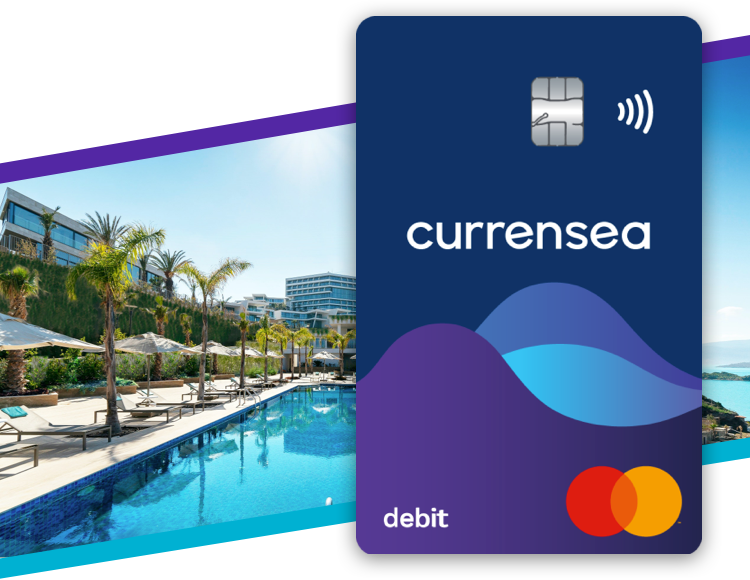
Tesco prepaid travel cards hidden fees
You can load up to 7 different currencies onto the Tesco Multi-currency Cash Passport and use it wherever Mastercard Prepaid is accepted. However, as we've already stated there there is a 2% fee if you use the card in the UK and a £1.50 ATM withdrawal fee. You also can't apply for one online so have to go in branch and fill out forms which can be time consuming.
Prepaid travel cards also can’t be used in certain circumstances, such as in places that require a security deposit, and some petrol stations. Prepaid travel cards also don’t offer the same level of protection as credit cards.
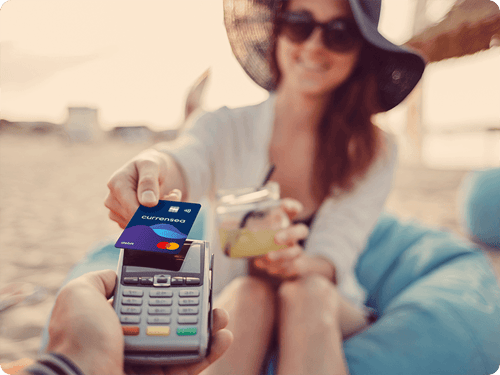
5 Things to consider before choosing a prepaid travel card
1. what’s the rate.
Prepaid travel cards offer a huge range of rates that might not be as good as the rate offered by your bank. Whilst almost all providers say no fees, the fee is often hidden in the exchange rate.
2. Does your prepaid travel card offer protection?
Some cards are covered by section 75 protection, but not all, it’s worth checking the T&Cs before you sign-up to ensure that all your purchases will be covered by some kind of chargeback protection.
3. Can you get back unused currency?
Once your holiday has finished you’re unlikely to want to leave any leftover currency on your prepaid travel card. Make sure that you can easily get your money back, without incurring further fees.
4. Are there any hidden fees?
Check for any fees, prepaid travel cards generally have more hidden fees than credit or debit cards. Make sure that you keep an eye out for fees such as application and replacement fees, transaction fees, and inactivity charges.
5. Are there any limitations to where you can use the different types of cards?
All providers say that they can be used wherever you see the Visa or Mastercard logo but there are some big exceptions that may impact your choice. If you want to pay at a petrol station, hire a car, or pay on a cruise - generally, you can only use a Credit, Debit, or Currensea’s travels debit card - prepaid travel cards are often not accepted.
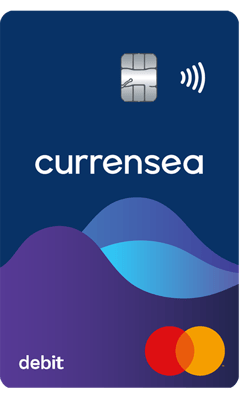
Better than a prepaid travel card
A better solution, offered by Currensea, is their travel debit card . You simply spend abroad in any desired currency as the money will be collected from your existing bank account by direct debit.
Plus, our free travel debit card and takes minutes to sign up.
Currensea's travel debit card explained in 30 seconds
No video selected
Select a video type in the sidebar.
Currensea's travel debit card can save you over £290 compared to your prepaid travel card and bank
Savings are based on a two week family holiday in florida, with currensea's travel debit card you don’t have to worry about topping up or juggling currencies. we automatically give you the best exchange rate, every single time you spend., you still get all the security of using your bank account, just without the fees. it’s as simple as that., see how much you can save, save in 180 currencies vs high street banks, prepaid travel cards and travel debit cards.

Find out more

Currensea's live exchange rate calculator
How much will you save?
Always get the best live exchange rates
Unlike Tesco we use the interbank exchange rate which guarantees to give you the lowest possible rates.
Our essential plan user's rate is 0.5% more than shown.
Our connected banks
We work with all the major uk high-street banks.

Read Currensea's reviews on Trustpilot
Why is currensea better than a prepaid travel card, we link with your current bank account via open banking to make saving money simple. you can find out more about open banking here.

No new bank account needed
Forget having to set-up and manage multiple accounts

No need to top-up or pre-pay
Remove the hassle and inconvenience of pre-loading another card

No ATM fees
Pay no ATM fees if you withdraw under £500
How Currensea works
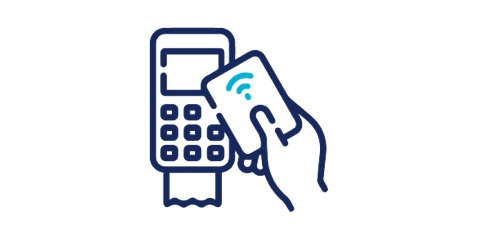
Link your bank account with Currensea
Currensea connects to your bank account removing bank fees when spending in foreign currency's
No topping up, no moving money and no new bank account needed
Better rates than the banks, post office or any FX provider

Like your debit card, but without fees
Pay in any of the 180 currencies across the world
Transactions go through at the real-time rate without any fees
Get an app notification and email detailing your spend and savings using Currensea vs your bank

We process all of your transactions
We automatically Direct Debit your linked bank account
All transactions are shown in your Currensea App
- Once processed, your transactions appear on your bank account
Your account is secure with Currensea

Authorised by the Financial Conduct Authority

Freeze your card anytime at the click of the button via the app

All purchases protected by Mastercard Chargeback Protection
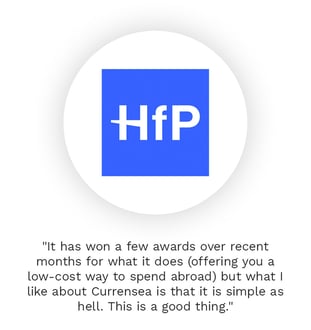
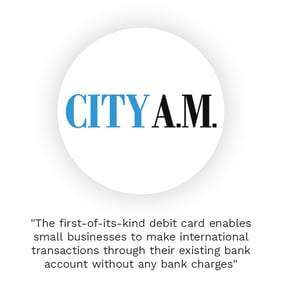
- Orlando Tourism
- Orlando Hotels
- Orlando Bed and Breakfast
- Orlando Vacation Rentals
- Flights to Orlando
- Orlando Restaurants
- Things to Do in Orlando
- Orlando Travel Forum
- Orlando Photos
- Orlando Map
- All Orlando Hotels
- Orlando Hotel Deals
- Last Minute Hotels in Orlando
- Things to Do
- Restaurants
- Vacation Rentals
- Travel Stories
- Rental Cars
- Add a Place
- Travel Forum
- Travelers' Choice
- Help Center
Prepaid Travel Money cards - Post Office? - Orlando Forum
- United States
- Florida (FL)
- Central Florida
- Orlando
Prepaid Travel Money cards - Post Office?
- United States Forums
- Europe Forums
- Canada Forums
- Asia Forums
- Central America Forums
- Africa Forums
- Caribbean Forums
- Mexico Forums
- South Pacific Forums
- South America Forums
- Middle East Forums
- Honeymoons and Romance
- Business Travel
- Train Travel
- Traveling With Disabilities
- Tripadvisor Support
- Solo Travel
- Bargain Travel
- Timeshares / Vacation Rentals
- Central Florida forums
- Orlando forum

Has anyone had any experience with the Post Office prepaid cards? I don't want to take all cash on my trip as I just won't feel safe carrying it around & was looking to get a travel money card for our meals out in the evenings etc.
Are there any you would recommend? Do you just use them like a debit card?
Many thanks :)

The cards debate has been done on here a billion times. Use the search box, it is a great resource.
Here is just one of those threads with some recent replies....
http://www.tripadvisor.co.uk/ShowTopic-g34515-i19-k5349737-Post_office_travel_card-Orlando_Florida.html

I have used the Post office Mastercard credit card and that is a best buy to use abroad and I would certainly get it for large spend items and pay the bill off at the end of the month.
For pre paid debit card, Caxton or FairFX are regarded as the good ones for UK visitors.

I wouldn't recommend the post office pre paid card. Used one in August, wouldn't let me withdraw $500 at one time from an ATM even though it was advertised as such (tried several different ATMs and they all said $300 was the limit) so I incurred more fees then anticipated. Tried to use it in a shop at the end of our hol to use up the balance and it was rejected despite being in funds.
Should have listened to folks on here and gone for another provider

As MrM states lots of debate on here. I have used the caxtonFX card a few times and never had a problem. I think the answer is to take a range of funds, cash, credit, prepaid. Don't put all your eggs in one basket.

Debate or not some one asked its a forum for chat please be nice there in no need to be rude !
Lisa have you resurrected this post just to tell people off or do you have some further information on the subject matter to impart
Indeed Susie. Quite right. And why is it that so many folk on here seem to get so upset over what are straightforward answers / advice that give the OP the information they need? Rude? Where exactly?
LMAO it would seem I now am getting told off merry Christmas , peace be with you xxxxxxxx
IMHO it is also a good idea to take a credit card with you in case of emergencies.
We bought a post office money card for euros as we were driving through Europe. The advertising says that it isaccepted just about anywhere. It is not. Some garages would not, some shops would not and when we tried to upgrade - well what a palaver!They are happy to take your money but when it comes to loading it on the card well we have been waiting 6 days now and we are still no further forward. My husband is halfway across Europe and the card has been declined twice as there are apparently no funds. What a load of rubbish. Fortunately he has other funds with him but the whole idea of this card was to buy fuel and pay tolls quickly and easily.For omeone who is just going to one resort and doing normal holiday things probably fine but if you are going 'off piste' so to speak take something else with you!
- Dancing for 30-somethings? 10:27 pm
- Tips using dining credit 5:41 pm
- Universal HHN regular access 3:14 pm
- Universal studios and Disney - hotel recommendations 12:17 pm
- Universal studios- First time 12:12 pm
- Best Beach Town to stay in for 5 Nights after Universal today
- 7 day passes today
- Hotel with great pool near convention center? Which park? today
- First time visitor today
- Universal Tickets via TUI today
- Spending money for 2 weeks today
- Ratatouille themed restaurant? yesterday
- Orlando soccer tournament in July yesterday
- GAA matches yesterday
- hotel with nice waterslides 9 replies
- Best family beach near Orlando 27 replies
- Driving from Orlando to Miami 17 replies
- New Hotels / Resorts Opening in Orlando? 14 replies
- hotel near disney world with free shuttle??? 9 replies
- Beaches Near Orlando 19 replies
- Disneyworld tickets from Costco? 2 replies
- Discovery Cove promotional code 15% off 9 replies
- Weather in Orlando Florida in December 9 replies
- December weather 16 replies
Orlando Hotels and Places to Stay
- I’m about to leave…how’s the weather right now?
- How much does it cost to park?
- What Bus Services can I use in Orlando?
- Can I take food/drinks into the theme parks?
- Where can I find a map of Villa rental locations?
- What is Disney's PhotoPass? / How do I preorder the Photo CD? / PhotoPass+?
- Can you tell me more about refillable mugs at Disney World?
- Which Airboat Operators are Reputable
- Charges/cover and age at CityWalk???


- Saving & banking
- Cost of living & bills
- Cards & loans

- Are pre-paid travel money cards worth it? Holidaymakers could be charged to get back unused cash
- The average pre-paid card user returns home with £89 left unspent
- Travel debit cards could prove a cheaper way of spending your money abroad
By Harvey Dorset
Updated: 03:45 EDT, 25 May 2024
View comments
Holidaymakers are returning from abroad with an eye-watering £429million of unspent cash on their prepaid travel cards, research claims.
The amount left on prepaid cards has increased by 16 per cent from £369million last year, according to travel debit card firm Currensea.
These travellers may face additional fees and poor exchange rates when they withdraw their remaining cash, while many will simply forget about the leftover funds on their card after they return home.
Prepaid cards are chip and pin cards that allow travellers to load up cash in a different currency in advance, and avoid using their main bank account while on holiday.

Tap and go: Prepaid travel cards are convenient, but can incur fees to withdraw any money left on them at the end of the holiday
They are offered by lots of firms including the Post Office, Sainsbury's, Travelex and Mastercard.
On average, travellers return from trips with £89 left on their prepaid cards, while 27 per cent of those using these cards have more than £100 left to spend, according to Currensea.
A whopping 42 per cent of those with school-age kids return with more than £100, with the average at £109.
RELATED ARTICLES

Share this article
James Lynn, co-founder of Currensea, said: 'UK travellers are wasting a huge chunk of their holiday savings by sticking with costly and inconvenient pre-paid cards which offer poor value, high fees and require the hassle of topping up.
'Topping up pre-paid cards before you travel leaves no room for error and often leaves holidaymakers scrambling for money at extortionate ATMs, facing steep bank charges when they have to rely on their bank card, or risking returning from holiday with huge amounts leftover on pre-paid cards.'
What are prepaid cards and what are the fees?
Prepaid travel cards work in much the same way as a credit or debit card, allowing you to withdraw from cash machines or spend your money in shops and restaurants.
The key difference is that the card is only loaded with as much money as you are willing to spend.
This has its benefits, allowing you to budget more effectively, as well as locking in one foreign exchange rate when you load the card, instead of a different rate every time you spend.
- Hidden mobile roaming charges set to end - but not in time for summer: How to avoid a hefty bill in the meantime

Some 13 per cent of holidaymakers opt for prepaid cards as their preferred method of holiday spending, according to Currensea.
However, these cards often charge a fee when you load the card, charge fees on cash withdrawal and sometimes even on transactions.
For example, Caxton's prepaid travel card will charge £1.50 on withdrawals back in the UK, while the Post Office travel money card will charge the same.
Both cards also impose a £2 monthly fee for inaction after a 12-month period.
A third of pre-paid card users are under the impression that they offer better exchange rates than other payment methods, meaning that they could still be losing out even if they do spend all the money on their card.
In fact, regular debit cards that don't charge fees for use abroad often offer a better deal.
For example, a Monzo debit card will allow you to buy €1.1697 for every £1, whereas Caxton's black card will buy you just €1.14.
Currensea's own offering, meanwhile, will buy you €1.1676.
Lynn said: 'Millions of people still wrongly believe that pre-paid cards offer the best solution when spending money abroad.
'They're no longer more secure than bank cards as most bank and card providers allow you to simply freeze your card if it is missing or stolen and the fees are uncompetitive.
'By adopting smarter spending habits, travellers can avoid excessive foreign exchange fees, securing as good a deal on their holiday spending as they do on flights or accommodation.'
With pre-paid cards having their drawbacks, what other options are available?
Cash remains king
Gone are the days where an envelope full of foreign cash was an essential part of planning a trip abroad. Nevertheless, more than half of travellers still count it as an important part of their spending.

The old adage of 'cash is king' proving true, as 58 per cent of Brits still favour physical money while on holiday, according to Currensea.
More than a quarter of people, 27 per cent, said they use their credit card while abroad, while 27 per cent also use a high street bank card.
Spending cash may also help you to stick to your budget.
With many ATMs charging withdrawal fees in foreign countries, taking out cash beforehand can prove a sensible decision, especially as you can compare the exchange rates offered by various vendors.
However, these rates might not be the best, especially if you leave it until you get to the airport to change your sterling.
On top of this, travelling with cash leaves you at risk of losing it or having it stolen.
Which debit cards still allow you to spend abroad for free?
The majority of credit and debit cards allow spending abroad, but may charge you a foreign transaction fee for the privilege.
However, there are a number of cards, both credit and debit, that will allow you to spend abroad for free.
Amongst the banks that offer debit cards with free spending abroad are Chase, Monzo, Starling Bank and First Direct.
Alternatively, some credit cards, such as the Barclaycard Rewards Visa and the Halifax Clarity Mastercard offer fee-free spending abroad, although Halifax can charge up to 28.94 per cent interest on cash withdrawals daily until repaid.

Share or comment on this article: Are pre-paid travel money cards worth it? Holidaymakers could be charged to get back unused cash
Some links in this article may be affiliate links. If you click on them we may earn a small commission. That helps us fund This Is Money, and keep it free to use. We do not write articles to promote products. We do not allow any commercial relationship to affect our editorial independence.
More top stories
- Best savings rates tables
- Find the best mortgage calculator
- Power Portfolio investment tracker
- Stock market data and share prices
- This is Money's podcast
- This is Money's newsletter
- The best DIY investing platforms
- The best bank accounts
- The best cash Isas
- The best credit cards
- Save on energy bills
- Compare broadband and TV deals
- How to find cheaper car insurance
- Investing Show videos
- Financial calculators
HOW THIS IS MONEY CAN HELP

MORE IN HOLIDAYS
Latest from Holidays

- Car hire costs this summer down 43% as rental firms restore supply of vehicles
- Why experts say you should buy half your holiday cash now and the rest after the election
- Air Mauritius lost my luggage and it ruined my holiday: Can I get compensation? CRANE ON THE CASE
- Compare money transfer exchange rates in THREE easy steps
- Going high in Kuhtai - a rooftop Alpine pool and the magic ingredients for a short ski break
- New CT scanners at airports could slash baggage costs - but which airline charges most?
- We couldn't travel to Hawaii due to wildfires - but Southdowns won't pay insurance claim: CRANE ON THE CASE
MORE HEADLINES
TRAVEL ESSENTIALS

TRAVEL: TIPS & GUIDES

Head Start to Home Cooked
This is Money is part of the Daily Mail , Mail on Sunday & Metro media group
- Prepaid Cards >
- Travel Prepaid Cards
Compare our best prepaid travel cards
Simplify your spending abroad with a prepaid travel card, find a prepaid travel card, what is a prepaid travel card.
A prepaid travel card , also known as a 'travel money card', is a debit card that you preload with money and take on holiday. It's a good way to stick to your holiday budget and avoid carrying a lot of cash.
Prepaid travel cards can be used at cashpoints, in shops and restaurants , or anywhere that accepts Mastercard or Visa debit or credit cards.
However, a prepaid travel card is not the same as a credit card for two key reasons:
You can only spend the amount you have put on the card; the pre-loaded limit prevents you overspending and getting into debt
You can choose which currency to preload your travel money card with depending on where you're going, which often means you can secure a better exchange rate
Pick a card with fees that suit how you plan to use it, e.g. choose one with no withdrawal fees if you'll be withdrawing cash often while travelling.”
What are the different types of prepaid travel cards?
Multi-currency prepaid cards.
These can be loaded with several different currencies , making them ideal for both frequent travellers and those taking trips to multiple destinations. For example, you holiday in Europe but often visit the US on business, you could use a prepaid travel card to cover your everyday spending wherever you are by topping it up with say £600 then exchanging £200 into euros and £200 into US dollars. The different currencies will then be stored in separate “wallets” , allowing you to switch currencies when you like.
Sterling prepaid cards
These can be used at home and abroad , making them even more flexible than the best travel cards offering multiple currencies. You don’t need to worry about setting up a wallet for the currency you want to use; the card provider simply converts your pounds to the required currency each time you make a purchase . However, this can make holiday budgeting harder and may increase your costs, depending on the charging structure.
Euro prepaid cards
As well as multi-currency cards, you can take out prepaid cards designed to hold a specific currency . This can work out excellently if you're trying to lock in a good rate now by loading your euro prepaid card, but if you then use the card to buy things in a country that isn't in the eurozone. That's because if you spend in a country that does not use the euro, it converts to the local currency each time you make a purchase, which can work out more expensive.
Prepaid US dollar cards
These keep your balance in dollars . If you spend in countries that use a different currency, the card will exchange your dollars to the local currency, and you might well be charged a fee. The currency exchange takes place as soon as you load your card . If the pound strengthens afterwards, you won’t be getting the best value for money, but it if weakens you'll do well.
How to get a prepaid travel card
Compare cards.
Use our table below to find prepaid travel card that offers the features you need with the lowest fees
Check your eligibility
Make sure you fit the eligibility criteria for your chosen travel money card and can provide the required proof of ID
Apply for the card
Click 'view deal' below and fill out the application form on the provider's website with your personal details
What are the eligibility requirements?
Anyone can get a prepaid travel card. There's no need to have a bank account, and no credit checks are required . Some providers have a minimum age of 18, but many will let you have a prepaid card from the age of 13 with parental consent.
Sometimes parents like to use travel money cards to give their children a set amount of holiday money , and to help teach them about budgeting and financial responsibility.
Pros and Cons
What exchange rate do you get.
Exchange rates vary over time depending on what is happening in the wider economy. That means the exchange rate you get on a US dollar travel card today, for example, might not be the same as you get tomorrow or next week.
What prepaid cards offer is the ability to lock in today's rate to use later on. That could see you better off if the pound weakens, but might also mean you get a poor deal if the pound strengthens.
That offers is certainty - you'll know exactly how many dollars, euros, lira or whichever currency you load onto the card you have to spend on holiday.
Today’s best exchange rates
At what point is the currency exchanged with prepaid travel cards.
Some prepaid travel cards hold the balance in pounds sterling. These convert the required amount to the local currency every time you spend on them .
The exchange rate isn’t fixed, so you’ll only know how many pounds you have on the card - not what it will buy you while overseas.
But the cards in our comparison table convert your money when you add it onto the card. This means you know the exchange rate used and your card's exact balance before you go away.
Compare the rates before you choose a prepaid card. Although rates can change several times a day, some travel cards will be more competitive than others.
Using a card with competitive exchange rates will mean you get more local currency for your pound.
You also need to watch out for fees as well as withdrawal limits when choosing a card, as these can vary between providers.
What are the alternatives to prepaid travel cards?
Travel credit card.
A travel credit card works just like a regular credit card, with which you can make purchases by borrowing money. The main difference is that travel credit cards don't charge foreign transaction fees for spending abroad.
Travel money
For many people, cash is the most comfortable form of payment when travelling. It's hassle-free and universally accepted. But it’s riskier, as you'll lose out if it’s lost or stolen and you’ll need to budget carefully to ensure your foreign currency lasts the length of your trip.
Travel debit card
These days, there are plenty of specialist banks and providers that offer bank accounts that don't charge foreign transaction fees when used abroad. This offers you a chance to take advantage of the best exchange rates. And if it's your main current account, you won't have to worry about topping up your account before you go.
What other costs or fees are there with prepaid travel cards?
As well as the exchange rate, you might have to pay several other charges on your prepaid travel card.
These could include:
A fee to buy the card
A monthly or annual fee for keeping the account open
Cash withdrawal fees
Transaction fees when you pay for anything on the card
Inactivity fees
Loading fees when you add money onto the card
Some cards also charge fees for withdrawing cash or making purchases inside the UK .
But some of the cards in this comparison do not charge fees in countries that use currencies loaded on the card - just make sure the right one is selected before spending on them.
Check carefully for fees before you pick one.
Read our full guide on how much it costs to use a travel prepaid card and how to choose one .
"With multi-currency cards, check you've selected the right currency before you arrive."
How long does it take to get a prepaid travel card?
You can apply online and get a decision immediately. However, it can take up to two weeks before your card arrives in the post.
Can I use any prepaid card abroad?
Yes, you can use prepaid Visa or Mastercard cards in most destinations worldwide. Travel prepaid cards are usually cheaper to use overseas than a standard credit or debit card.
Can I withdraw cash abroad?
Yes, you can use a travel money card in a cash machine outside the UK. Some cards charge fees for this, so always check if you want to use your prepaid travel card to make cash withdrawals.
What currencies can my card hold?
All the travel money cards in our comparison can hold a balance in popular currencies such as euros or dollars, while some support more than 50 different currencies.
Can I make international payments?
Yes, some providers let you send or receive money from abroad by logging into your online account, which works in the same way as standard internet banking.
Who sets the exchange rate?
This depends on the company that processes the transactions. Typically, it’s down to Visa or Mastercard , as well as your card provider, which may take an additional cut.
Can I use my prepaid card in the UK?
You can use prepaid cards to withdraw cash or buy things in the UK or online. However, you may pay fees or even an exchange rate if your card is loaded with a foreign currency.
Explore our prepaid card guides

About the author

Didn't find what you were looking for?
Our most popular prepaid card deals
Other products that you might need for your trip
Customer Reviews

Hub of information!

Super accessible and easy to use
Very helpful
Card Accounts
Business Accounts
Other Accounts and Payments
Tools and Support
Personal Cards
Business Credit Cards
Corporate Programs
Prepaid Cards
Personal Savings
Personal Checking and Loans
Business Banking
Book And Manage Travel
Travel Inspiration
Business Travel
Services and Support
Benefits and Offers
Manage Membership
Business Services
Checking & Payment Products
Funding Products
Merchant Services
Business Services Home Business Cards All Cards (14) All Cards (14)
5x membership rewards points on flights and prepaid hotels booked at amextravel.com. ‡, access to 1,400+ airport lounges worldwide ‡, up to $400 back (up to $200 semi-annually) on u.s. purchases with dell technologies through 12/31/24. enrollment required. ‡, 4x membership rewards points on your top 2 eligible categories. cap applies. ‡, $240 flexible business credit ‡, walmart+ monthly membership credit ‡, discover which card with flexible payment solutions is best for your business, 2% cash back on all eligible purchases, on up to $50k in purchases each calendar year ‡, 1% cash back on your other purchases ‡, expanded buying power ‡, 2x points on all eligible purchases, up to $50k per calendar year ‡, 1x points on your other purchases ‡, 1.5% early pay discount ‡, extra days to pay ‡, no foreign transaction fees ‡ ¤, 2x points on amextravel.com ‡, pay over time option ‡, expense management solutions, 5% back on u.s. purchases at amazon.com ‡, 2% back on select u.s. categories ‡, amazon business enhanced data views ‡, 3% back on u.s. purchases at amazon.com ‡, 3x miles on eligible delta & eligible hotel purchases ‡, up to $120 back on eligible resy purchases using your enrolled card ‡, mqd headstart: get closer to status ‡, takeoff 15: save on award travel ‡, $200 delta flight credit towards future travel after $10k in purchases in a year ‡, 2x miles on u.s. shipping and u.s. advertising ‡, complimentary access to the centurion lounge when you purchase a delta flight with your card ‡, earn 1.5x per dollars on eligible transit, u.s. shipping & office supply store purchases ‡, up to $240 back on eligible resy purchases using your enrolled card ‡, 12x hilton honors bonus points on eligible hilton purchases ‡, 5x hilton honors bonus points on other purchases ‡, get up to $240 back per year on eligible hilton purchases ‡, earn 6x marriott bonvoy points at hotels participating in the marriott bonvoy ® program ‡, marriott bonvoy ® room rate discount ‡, marriott bonvoy gold elite status ‡, lowe's 5% discount ‡, earn cash back * on every eligible purchase with your lowe's business rewards card ‡, employee cards ‡.
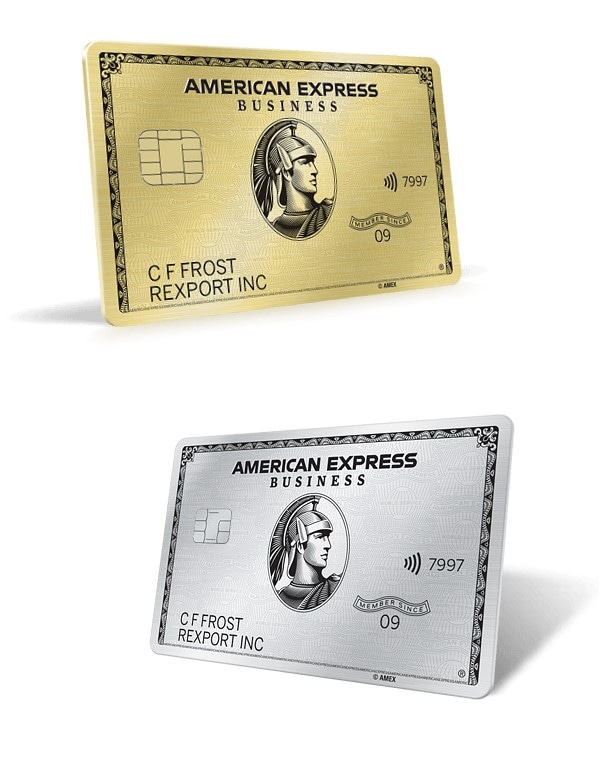
Enjoy exceptional rewards and benefits of Business Cards from American Express
Make the most out of your company's purchases.
Amex Offers
Expense tools, frequently asked questions (faqs).
American Express offers a range of Small Business Credit Cards to help your business grow. Enjoy benefits across our suite of products such as cash back in the form of a statement credit, travel rewards, flexible payment options, and Membership Rewards ® points ‡ . Choose the Small Business Card from American Express that's right for your business. Below are some Frequently Asked Questions to help you select the Small Business Card that's best for your business:
Benefits of an American Express Small Business Credit Card
Using your american express small business card, applying for an american express small business card.
Here Are the Four Best Travel Money Cards in 2024

François Briod
Co-Founder of Monito and money transfer expert, François has been helping Monito’s users navigate the jungle of money transfer fees, bad exchange rates and tricks for the last ten years.
Jarrod Suda

A writer and editor at Monito, Jarrod is passionate about helping people apply today’s powerful finance technologies to their lives. He brings his background in international affairs and his experiences living in Japan to provide readers with comprehensive information that also acknowledges the local context.
Links on this page, including products and brands featured on ‘Sponsored’ content, may earn us an affiliate commission. This does not affect the opinions and recommendations of our editors.
From the multitude of bank fees and ATM charges to hidden currency conversion fees, there's no question that spending your money abroad while travelling can be costly — and that's saying nothing about the cost of the holiday itself!
As you prepare for your trip abroad, the golden rule is that you'll save the most money by using the local currency of your destination. This means withdrawing local cash at foreign ATMs and using a debit card to pay directly in the local currency. For example, if you're from the UK, using your bank's debit card that accesses your British pounds will likely lose you money to hidden fees at ATMs abroad and at local merchants.
In general, we rate Revolut as the best travel card all around. Its versatile account and card can be used to spend like a local pretty much anywhere in the world. ✨ Get 3 months of free Revolut Premium as a Monito reader with our exclusive link .
If you're from the EU, UK, or US, here are a few more specific recommendations to explore:
- Best for travelling from the UK: Chase
- Best for travelling from the US: Chime ®
- Best for travelling from the Eurozone: N26
If it's not possible for you to spend in the local currency when travelling abroad, then spending in your home currency while using a card that doesn't charge any hidden exchange rate markups from your bank (e.g. only the VISA or Mastercard exchange rates to convert currency) is still a good bet for most people.
In this guide, we explore cards that waive or lower ATM fees and that hold multiple currencies. Spend on your holiday like a local and enjoy peace of mind after each tap and swipe!
Best Travel Cards (And More!) at a Glance
Best travel money cards.
- 01. What is the best best multi currency card? scroll down
- 02. Are prepaid currency cards really it? scroll down
- 03. Monito's best travel money card tips scroll down
- 04. FAQ about the best travel cards scroll down
Revolut: Best All-Rounder
Revolut is one of the most well-known fintechs in the world because it offers services across Europe, the Americas, Asia, and Oceania.

- Trust & Credibility 8.9
- Service & Quality 7.9
- Fees & Exchange Rates 8.3
- Customer Satisfaction 9.4
Revolut is available in many countries. You can double-check if it's available in yours below:
Here's an overview of Revolut's plans:
Revolut Ultra is currently only available in the UK and EU.
Like Wise, Revolut converts your currency to the local currency of your travel destination at an excellent exchange rate (called the 'Revolut Rate', which, on weekdays, is basically on par with the rate you see on Google), making it a good way to buy foreign currency before travelling abroad. As always though, bear in mind that Revolut's exchange rates might be subject to change.
Revolut's Standard Plan only allows currency exchange at the base mid-market exchange rate for transfers worth £1,000 per month. ATM withdrawals are also free for the first €200 (although third-party providers may charge a withdrawal fee, and weekend surcharges may also apply). These allowances can be waived by upgrading memberships.
N26: Good Bank For EU Travellers
One of the most well-known neobanks in Europe, N26 and its debit card operate in euros only. However, N26 is a partner with Wise and has fully integrated Wise's technology so that you never have to pay foreign transaction fees on your purchases outside of the eurozone. While N26 does not have multi-currency functionality, N26 will apply the real exchange rate on all your foreign purchases and will never charge a commission fee — making N26's card a powerful card for EU/EEA residents who travel across the globe.

- Trust & Credibility 7.9
- Service & Quality 8.0
- Fees & Exchange Rates 9.3
- Customer Satisfaction 8.1
These are the countries in which you can register for an N26 account:
And here is an overview of the various plans and account:
This low-fee option for banking is also ideal for travellers who do not belong to a European bank but frequent the Eurozone. For example, N26 is available for residents and citizens of Switzerland, Norway, and other European Economic Area countries that do not run on the Euro.
These citizens, who are in close proximity to the Eurozone, will save each time they spend with an N26 card while in Europe. N26 provides three free ATM withdrawals per month in euros but does charge a 1.7% fee per ATM withdrawal outside of Europe.
Take a look at our guide to the best travel cards for Europe to learn more.
Wise: Best For Multi-Currency Balances
Load up to 54 currencies onto this card at the real exchange rate, giving you access to truly global travel.

- Trust & Credibility 9.3
- Service & Quality 8.9
- Fees & Exchange Rates 7.6
- Customer Satisfaction 9.6
These are the countries in which you can order a Wise debit card:
Unlike banks, credit unions, airport kiosks, and foreign ATMs, Wise is transparent about never charging a hidden exchange rate margin when you convert your home currency into up to 54 currencies. The live rate you see on Google or XE.com is the one you get with Wise.
An industry-low commission fee per transaction will range from 0.35% to 2.85%, depending on the currency.
Chase: Great UK Bank For Travel
A recent arrival from the USA, Chase is one of the UK’s newest digital challenger banks and comes with a rock-solid reputation and no monthly charges, no currency conversion charges, no withdrawal fees, and no other charges for everyday banking from Chase. It’s a simple, streamlined bank account with an excellent mobile banking app and a great cashback offer. However, it doesn’t yet offer more advanced features like international money transfers, joint accounts, business banking, overdrafts and loans, and teen or child accounts.

- Trust & Credibility 10
- Fees & Exchange Rates 10
- Customer Satisfaction 8.7
Chime: Great Account For US Travelers
Chime is a good debit card for international travel thanks to its no foreign transaction fees¹. Unlike multi-currency accounts like Revolut (which let you hold local currency), Chime uses the live exchange rate applied by VISA. This rate is close to the mid-market rate, and Chime does not add any extra markup to your purchases, although out-of-network ATM withdrawal and over-the-counter advance fees may still apply.

- Trust & Credibility 9.5
- Service & Quality 8.8
- Fees & Exchange Rates 9.8
While Chime waives ATM fees at all MoneyPass, AllPoint, and VISA Plus Alliance ATMs within the United States, this fee waiver does not extend to withdrawals made outside the country. For withdrawals abroad, Chime applies a $2.50 fee per transaction, with a daily withdrawal limit of $515 or its equivalent. This is in addition to any fees charged by the ATM owner. Therefore, we recommend Chime primarily for card purchases rather than relying on it for withdrawing cash while traveling internationally.
- No foreign transaction fees ¹;
- Uses VISA's exchange rate ( monitor here ):
- A $2.50 fee per ATM withdrawal made outside of the United States;
- More info: Read our Chime review or visit their website .
Best Travel Money Cards in 2024 Compared by Country
In the table below, see our comparison summary of the four best travel cards for 2024 by country:
Last updated: 8 January 2024
What's The Best Prepaid Card to Use Abroad?

Travel cards come in many varieties, such as standard credit cards or debit cards with no foreign transaction fees or cards that waive all foreign ATM withdrawal fees.
What is a Multi-Currency Card?
Multi-currency cards are a specific type of travel card that allows you to own all kinds of foreign currencies, which you can instantly access when you pay with your card abroad. By spending the local currency in the region of travel , you bypass poor foreign exchange rates. ATMs and cashless payment machines will treat your card like a local card.
We have already mentioned a few multi-currency cards in this review, but we will also introduce Travelex . Travelex's Money Card also allows you to top up several foreign currencies — albeit at exchange rates slightly poorer than the real mid-market rate .
Wise Account
Wise has one of the best multi-currency cards available on the market.

Read our full review for more details.
Revolut is impressive for its vast options in currencies and its additional services.
Our in-depth review explores Revolut's services in detail.
Travelex offers a prepaid travel money card that supports 10 currencies and waives all ATM withdrawal fees abroad.

- Trust & Credibility 9.0
- Service & Quality 5.8
- Fees & Exchange Rates 7.1
- Customer Satisfaction 9.3
Travelex charges fees, which fluctuate according to the exchange rates of the day, in order to convert your home currency into the currencies that it supports. But once the currency is on the card, you'll be able to spend like a local. Learn more with our full review .
Don’t Let Banks, Bureaux de Change, and ATMs Eat Your Lunch 🍕!
Are you withdrawing cash at an ATM in the streets of Paris? Exchanging currencies at Gatwick airport? Paying for a pizza with your card during a holiday in Milano? Every time you exchange currencies, you could lose between 2% to 20% of your money in hidden fees . Keep reading below to make sure you recognize and avoid them.
Currency Exchange Fees Eating My Lunch? What’s That?
You’re often charged a hidden fee in the form of an alarming exchange rate.
At any given time, there is a so-called “ mid-market exchange rate ” — this is the real exchange rate you can see on Google . However, the money transfer provider or bank you use to exchange currencies rarely offers this exchange rate. Instead, you will get a much worse exchange rate. They pocket this margin between the actual rate and the poor exchange rate they apply, allowing the bank or money transfer provider to profit from the currency exchange.
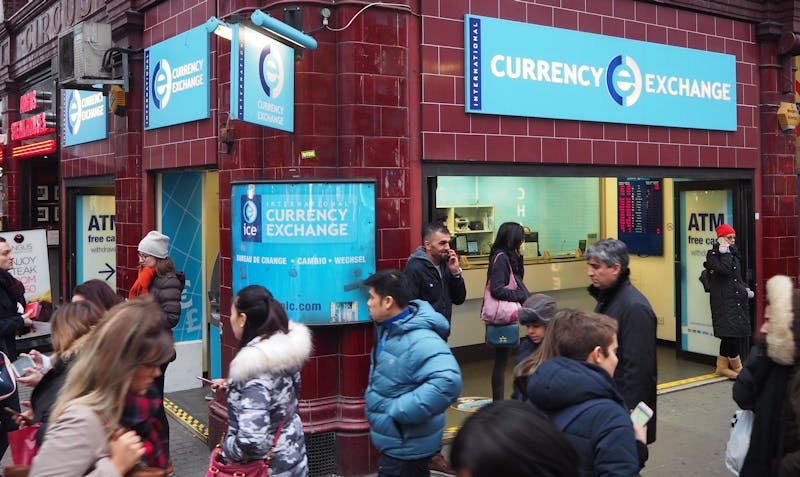
In other words, you or your recipient will receive less foreign currency for each unit of currency you exchange. All the while, the provider will claim that they charge zero commission or zero fees.
So the question now is… how can you avoid them? Thankfully, the best travel money cards will allow you to hold the local currency, which you can access instantly with a tap or swipe. Carrying the local currency avoids exchange rate margins on every purchase.
Top Travel Money Tips
- Avoid bureaux de change. They charge between 2.15% and 16.6% of the money exchanged.
- Always pay in the local currency and never accept the dynamic currency conversion .
- Don't use your ordinary debit or credit card unless it's specifically geared toward international use. Doing this will typically cost you between 1.75% and 4.25% per transaction. Instead, use one of the innovative travel money cards below.
By opting for a travel card without FX fees, you can freely swipe your card abroad without worrying about additional charges. However, saving money doesn't stop there. To make the most out of your travel budget, consider using Skyscanner , one of the most powerful flight search engines available that allows you to compare prices from various airlines and find the best deals.
With Skyscanner's user-friendly interface and comprehensive search options, you can discover cheap flights and enjoy your holidays with peace of mind and more money in your pocket.
Best Travel Money Card Tips

When you convert your home currency into a foreign currency, foreign exchange service providers will charge you two kinds of fees :
- Exchange Rate Margin: Providers apply an exchange rate that is poorer than the true "mid-market" exchange rate . They keep the difference, called an exchange rate margin .
- Commission Fee: This fee is usually a percentage of the amount converted, which is charged for the service provided.
With these facts in mind, let's see what practices are useful to avoid ATM fees, foreign transaction fees, and other charges you may encounter while on your travels.
Tip 1: While Traveling, Avoid Bureaux de Change At All Costs
Have you ever wondered how bureaux de change and currency exchange desks are able to secure prime real estate in tourist locations like the Champs-Élysées in Paris or Covent Carden in London while claiming to take no commission? It’s easy: they make (plenty of) money through hidden fees on the exchange rates they give you.
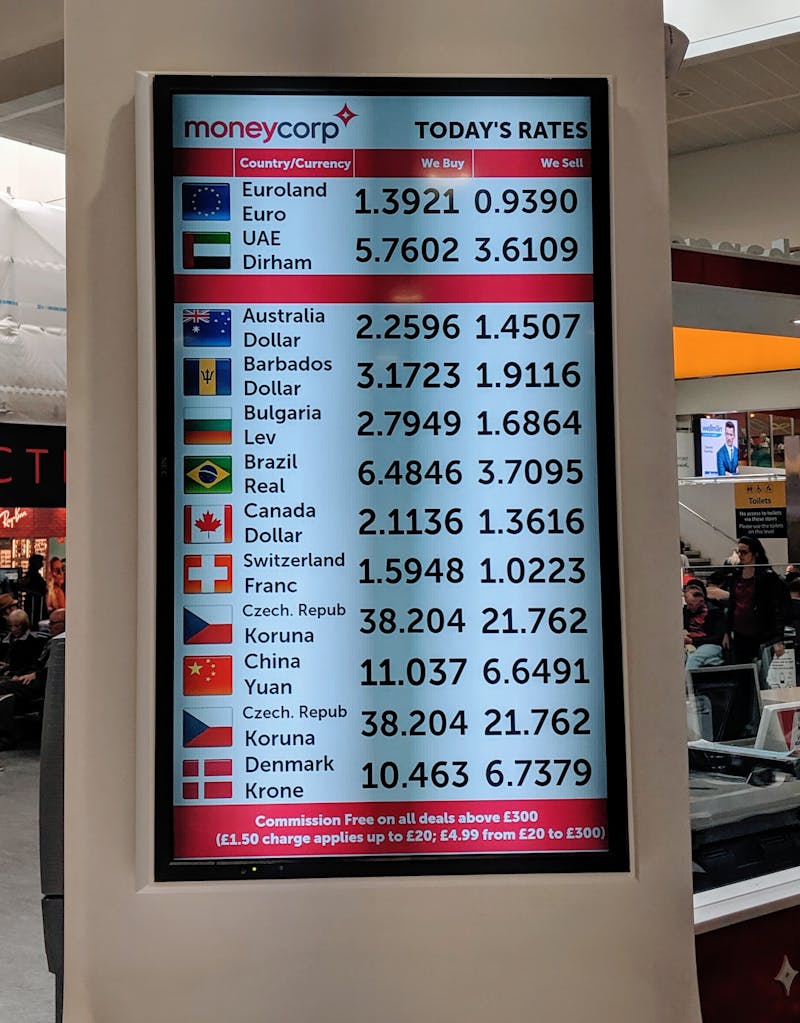
Our study shows that Bureaux de Change in Paris charges a margin ranging from 2.15% at CEN Change Dollar Boulevard de Strasbourg to 16.6% (!!) at Travelex Champs-Élysées when exchanging 500 US dollars into euros for example.
If you really want cash and can’t wait to withdraw it with a card at an ATM at your destination, ordering currencies online before your trip is usually cheaper than exchanging currencies at a bureau de change, but it’s still a very expensive way to get foreign currency which we, therefore, would not recommend.
Tip 2: Always Choose To Pay In the Local Currency

Don’t fall for the dynamic currency conversion trap! When using your card abroad to pay at a terminal or withdraw cash at an ATM, you’ve probably been asked whether you’d prefer to pay in your home currency instead of the local currency of the foreign country. This little trick is called dynamic currency conversion , and the right answer to this sneaky question will help you save big on currency exchange fees.
As a general rule, you always want to pay in the local currency (euros in Europe, sterling in the UK, kroner in Denmark, bahts in Thailand, etc.) when using your card abroad, instead of accepting the currency exchange and paying in your home currency.
This seems like a trick question - why not opt to pay in your home currency? On the plus side, you would know exactly what amount you would be paying in your home currency instead of accepting the unknown exchange rate determined by your card issuer a few days later.
What is a Dynamic Currency Conversion?
However, when choosing to pay in your home currency instead of the local one, you will carry out what’s called a “dynamic currency conversion”. This is just a complicated way of saying that you’re exchanging between the foreign currency and your home currency at the exact time you use your card to pay or withdraw cash in a foreign currency, and not a few days later. For this privilege, the local payment terminal or ATM will apply an exchange rate that is often significantly worse than even a traditional bank’s exchange rate (we’ve seen margins of up to 8%!), and of course, much worse than the exchange rate you would get by using an innovative multi-currency card (see tip #3).
In the vast majority of times, knowing with complete certainty what amount you will pay in your home currency is not worth the additional steep cost of the dynamic currency conversion, hence why we recommend always choosing to pay in the local currency.
Tip 3: Don't Use a Traditional Card To Pay in Foreign Currency/Withdraw Cash Abroad

As mentioned before, providers make money on foreign currency conversions by charging poor exchange rates — and pocketing the difference between that and the true mid-market rate. They also make money by charging commission fees, which can either come as flat fees or as a percentage of the transaction.
Have a look at traditional bank cards to see how much you can be charged in fees for spending or withdrawing $500 while on your holiday.
These fees can very quickly add up. For example, take a couple and a child travelling to the US on a two-week mid-range holiday. According to this study , the total cost of their holiday would amount to around $4200. If you withdraw $200 in cash four times and spend the rest with your card, you would pay $123 in hidden currency exchange and ATM withdrawal fees with HSBC or $110 with La Banque Postale. With this money, our travellers could pay for a nice dinner, the entrance fee to Yosemite Park, or many other priceless memories.
Thankfully, new innovative multi-currency cards will help you save a lot of money while travelling. Opening an N26 Classic account and using the N26 card during the same US holidays would only cost $13.60.
Need Foreign Cash Anyway?
In many countries, carrying a wad of banknotes is not only useful but necessary to pay your way since not every shop, market stall, or street vendor will accept card payments. In these cases you'll have two options to exchange foreign currency cheaply:
1. Withraw at an ATM
As we've explored in great depth in this article, withdrawing money from a foreign ATM will almost always come with fees — at the very least from the ATM itself, and so it's therefore the best strategy to use a travel debit card that doesn't charge in specific ATM withdraw fees on its own to add insult to injury. That said, if you need cash, we recommend making one large withdrawal rather than multiple smaller ones . This way, you'll be able to dodge the fees being incurred multiple times.
2. Buy Banknotes (at a Reasonable Rate!)
As we've also seen, buying foreign currency at the airport, at foreign bank branches, or in bureaux de change in tourist hotspots can be surprisingly expensive. Still, not all exchange offices are equally pricey . If you're looking for a well-priced way to exchange your cash into foreign currency banknotes before you travel, Change Group will let you order foreign currency online and pick them up at the airport, train station, or a Change Group branch just before you leave for your holiday. A few pick-up locations in the UK include:
- London centre (multiple locations),
- Glasgow centre,
- Oxford centre,
- Luton Airport,
- Gatwick Airport,
- St. Pancras Station.
(Note that Change Group also has locations in the USA, Australia, Germany, Spain, Sweden, Austria, and Finland!)
Although its exchange rates aren't quite as good as using a low-fee debit card like Revolut, Change Group's exchange rates between popular currencies tend to be between 2% to 3%, which is still a lot better than you'll get at the bank or at a touristy bureau de change in the middle or Paris or Prague!
FAQ About the Best Travel Money Cards
Having reviewed and compared several of the industry's leading neobanks, experts at Monito have found the Wise Account to offer the best multi-currency card in 2024.
In general, yes! You can get a much better deal with new innovative travel cards than traditional banks' debit/credit cards. However, not all cards are made equal, so make sure to compare the fees to withdraw cash abroad, the exchange rates and monthly fees to make sure you're getting the best deal possible.
- Sign up for a multi-currency account;
- Link your bank to the account and add your home currency;
- Convert amount to the local currency of holiday destination ( Wise and Revolut convert at the actual mid-market rate);
- Tap and swipe like a local when you pay at vendors.
Yes, the Wise Multi-Currency Card is uniquely worthwhile because it actually converts your home currency into foreign currency at the real mid-market exchange rate . Wise charges a transparent and industry-low commission fee for the service instead.
More traditional currency cards like the Travelex Money Card are good alternatives, but they will apply an exchange rate that is weaker than the mid-market rate.
The Wise Multi-Currency Card is the best money card for euros because unlike banks, credit unions, airport kiosks, and foreign ATMs, Wise is transparent about never charging a hidden exchange rate margin when you convert your local currency into euros with them.
The live rate you see on Google or XE.com is the one you get with Wise . An industry-low commission fee will range from 0.35% to 2.85%. USD to EUR transfers generally incur a 1.6% fee.
Learn more about how to buy euros in the United States before your trip.
There are usually three types of travel cards, prepaid travel cards, debit travel cards and credit travel cards. Each have pros and cons, here's a short summary:
- Prepaid travel cards: You usually need to load cards with your home currency via a bank wire or credit/debit card top-up. You're then able to manage the balance from an attached mobile app and can use it to pay in foreign currencies or withdraw cash at an ATM abroad tapping into your home currency prepaid balance. With prepaid travel cards, as the name indicates, you can't spend more than what you've loaded before hand. Some prepaid card providers will provide ways to "auto top-up" when your balance reaches a certain level that you can customize. On Revolut for example, you can decide to top-up £100/£200/£500 from your debit card each time your balance reaches below £50.
- Debit travel cards: Some innovative digital banks, like N26 or Monzo, offer travel debit cards that have the same advantages than a Prepaid Travel Cards, except that they're debit card directly tapping into your current account balance. Like a Prepaid travel card, you can't spend more than the balance you have in your current account with N26 or Monzo, but you can activate an overdraft (between €1,000 or €10,000 for N26 or £1,000 for Monzo) if you need it, for a fee though.
Note that even if they're Prepaid or Debit cards, you can use them for Internet payments like a normal credit card.
- Credit travel cards: You can find credit cards made for international payments offering good exchange rates and low fees to withdraw money abroad, but you'll need to pay interests in your international payment if you don't pay in FULL at the end of every month and interest on your ATM withdrawals each day until you pay them back.
Why You Can Trust Monito
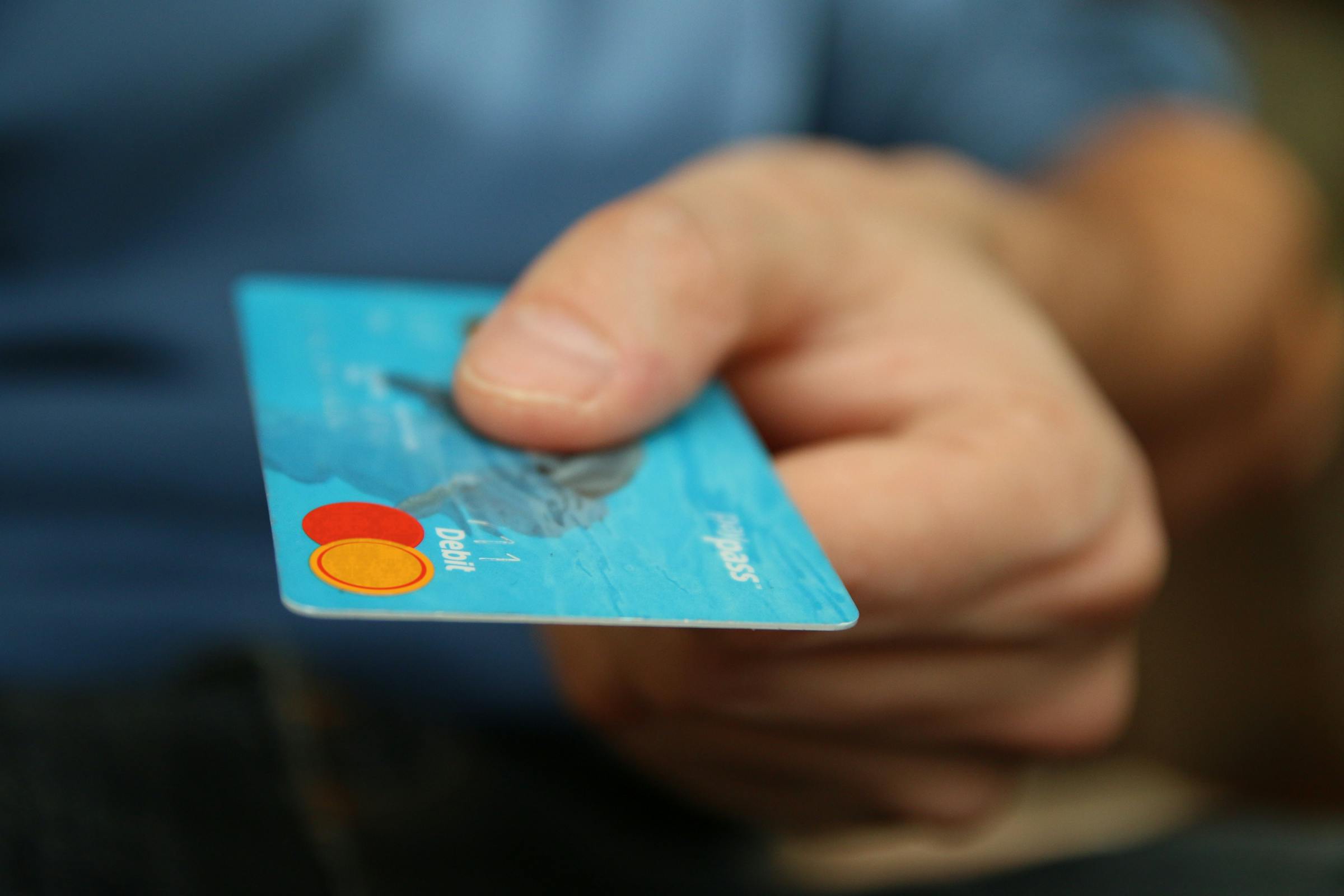
Our recommendations are built on rock-solid experience.
- We've reviewed 70+ digital finance apps and online banks
- We've made 100's of card transactions
- Our writers have been testing providers since 2013
Other Monito Guides and Reviews on Top Multi Currency Cards
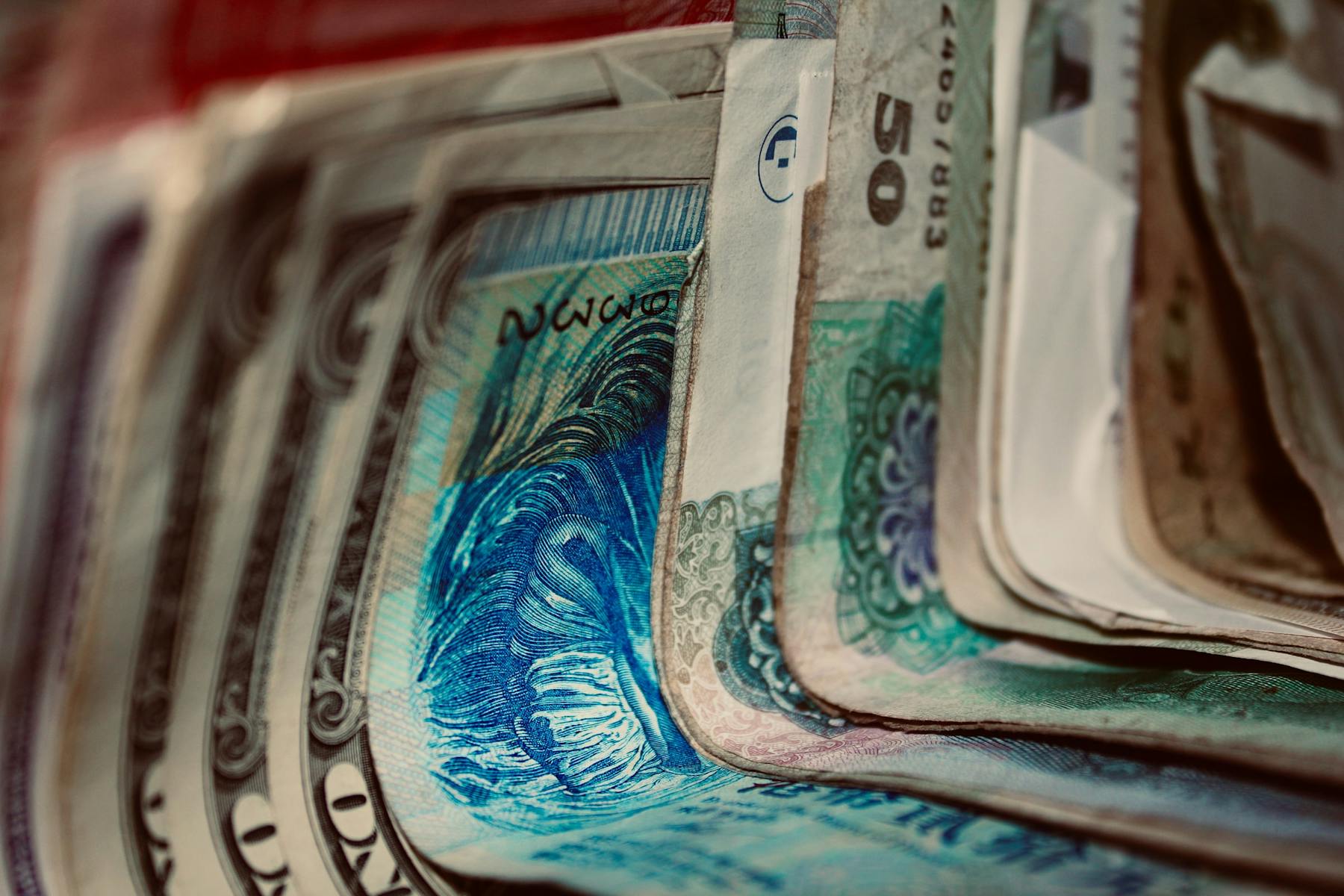
Why Trust Monito?
You’re probably all too familiar with the often outrageous cost of sending money abroad. After facing this frustration themselves back in 2013, co-founders François, Laurent, and Pascal launched a real-time comparison engine to compare the best money transfer services across the globe. Today, Monito’s award-winning comparisons, reviews, and guides are trusted by around 8 million people each year and our recommendations are backed by millions of pricing data points and dozens of expert tests — all allowing you to make the savviest decisions with confidence.
Monito is trusted by 15+ million users across the globe.
Monito's experts spend hours researching and testing services so that you don't have to.
Our recommendations are always unbiased and independent.

COMMENTS
Travelers looking to make purchases in Euros also have a range of prepaid card options to help make purchasing easier, many of which charge the same low fees as offered by cards for U.K. travelers. Here are some of the best deals on prepaid cards for travel around Europe: 1. FairFX Currency Card.
Top-pick prepaid travel cards. Top prepaid travel cards. Revolut - top rates on weekdays. Wise - top rates with low fees. Zing - third party rates but lowest fees. Top cards for under-18s to use abroad. HyperJar - fee-free spending, can't use ATMs. Nationwide - fee-free spending & withdrawals. GoHenry - free for two months + £5 ...
Again: Be sure to read through your card's fine print before embarking. Avoid holds at all costs: In a sense, prepaid travel cards work like debit cards. Be sure to avoid using a prepaid travel card to reserve a hotel room or a rental car, which can trigger a hold that could tie up hundreds of dollars of your cash for a week or longer.
Types of fees. Purchase fee: a set fee to purchase the prepaid card and can range from $0 - $15. Sometimes this fee can be a percentage of the initial load amount. Reload fee: charged by the bank or provider if during the trip you want to add extra money to the card. The standard fee for this is between 1- 1.1% of the reload amount.
If you're considering using a prepaid travel card for your international adventures, it's important to weigh the pros and cons to make an informed decision. Key Takeaways: Prepaid travel cards provide convenience and security when accessing cash in a foreign currency.
Prepaid travel cards offer an easy way to get cash in the local currency without the risk of using your own debit card, the cost of a credit card cash advance or the hassle of traveler's checks ...
Using a Prepaid Travel Card is a secure way of keeping the money for foreign trips as you can securely use for ATM withdrawals and shopping at foreign marts. As a traveler who wants to explore the world, you gain a lot with the use of the Prepaid Travel card. It comes with useful peeks of safety, budget, and multi-currency feature. ...
What can't this card do. Prepaid travel cards are separate to your bank and are specifically built for travellers. Just like your regular card, they can be tapped, swiped and inserted with pin protection to ensure you have access to your money when you need it. There are quite a few available across the market, but we're here to toot our own ...
The WeSwap Card: The WeSwap card also has no fees and offers competitive exchange rates. However, it does charge £1.50 for ATM withdrawals (although this is still cheaper than most other cards). The FairFX Card: FairFX Card is one of the best prepaid cards for traveling in Europe as it offers a number of benefits and features that can be ...
Prepaid Travel Card by Mastercard | Reloadable Travel Cards. MASTERCARD BENEFIT INQUIRIES. Within the U.S.: 1-800-Mastercard (1-800-627-8372) | Outside the U.S.: Mastercard Global Service Phone Numbers. Availability of insurance benefits on your card may vary by card issuer. Please refer to your issuing financial institution for complete ...
Prepaid Cards Can Save You Hundreds in Fees. To demonstrate exactly how much prepaid travel cards save over debit cards, let's compare fees on a two-week, multi-country European vacation for one traveller: Destinations: France, Italy, Germany; Spending: $100 (INR 8343.03)/day x 14 days = $1,400 (INR 116802.49)
As a general rule, a valuation of 1.5 to 2 cents per mile is decent for most airline miles. If you want to get the best credit card to earn your preferred airline miles, check out these lists ...
Information in the table was updated on 25 April 2024. The Post Office Travel Money Card and Travelex card can load the most currencies, however, charges apply for some cash withdrawals at an ATM wth the Post Office deal. Asda Money, Caxton, EasyFX, Sainsbury's and Travelex had similar offers with free ATM withdrawals.
The main difference between the two is that a travel credit card uses borrowed money, paid off in monthly instalments. This could be a great option if you need some more flexibility with your money. Meanwhile, a prepaid travel card is preloaded with your money, converted into the required currency. As these are prepaid, these cards work best ...
Let's compare Forex Card vs. credit card in detail: 1. Cost-Effectiveness. Considering Forex Card vs. Credit card, Forex cards often outperform Credit cards in terms of cost-effectiveness due to several factors. Firstly, they generally offer more favourable exchange rates when converting one currency into another.
Click on the links above to see the options and compare them with the prepaid travel cards on offer. The best fee-free credit cards to use abroad. Prepaid card comparison. Not all prepaid cards use the same exchange rate. Most use their own rates, which can vary hugely and you should compare before getting the card.
Travel prepaid cards. In a relatively recent development, some prepaid travel money cards now support South American currencies. For example, the Wise International Card allows you to convert, hold and spend Argentine pesos, Chilean pesos, Peruvian soles and Uruguayan pesos, as well as US dollars, which are also accepted in certain places.
Compare travel insurance quotes to find the right coverage for your trip. Read 1000s of trip insurance reviews by travelers like you & buy from InsureMyTrip! ... We evaluated popular credit cards & found while many cards offer basic travel insurance perks, few offer emergency medical coverage or robust trip cancellation protection. Read More ...
Here are some Scotiabank's fees and insurance benefits you would want to know for the travel cards they offer: Scotiabank Passport Visa Infinite Card. Scotiabank Gold American Express Card. Scotiabank American Express Card. Scotiabank Platinum American Express Card. Currency Conversion Charges. 2.5%². 2.5%². 2.5%².
Prepaid travel cards enable you to preload currency ready to spend when you're overseas. You can load one, or multiple currencies in advance - depending on the type of card you have. With a ...
Yes, the Tesco Multi-currency Cash Passport is a contactless prepaid Mastercard currency card, designed for overseas use. However, there is a 2% fee if you use the card in the UK and a £1.50 ATM withdrawal fee. Get my free travel money card.
10 years ago. I wouldn't recommend the post office pre paid card. Used one in August, wouldn't let me withdraw $500 at one time from an ATM even though it was advertised as such (tried several different ATMs and they all said $300 was the limit) so I incurred more fees then anticipated.
For example, Caxton's prepaid travel card will charge £1.50 on withdrawals back in the UK, while the Post Office travel money card will charge the same. Both cards also impose a £2 monthly fee ...
A prepaid travel card, also known as a 'travel money card', is a debit card that you preload with money and take on holiday. It's a good way to stick to your holiday budget and avoid carrying a lot of cash. Prepaid travel cards can be used at cashpoints, in shops and restaurants, or anywhere that accepts Mastercard or Visa debit or credit cards ...
Frequently Asked Questions (FAQs) American Express offers a range of Small Business Credit Cards to help your business grow. Enjoy benefits across our suite of products such as cash back in the form of a statement credit, travel rewards, flexible payment options, and Membership Rewards ® points ‡.Choose the Small Business Card from American Express that's right for your business.
Find the best travel money cards to stop banks and ATMs charge fees on travel money while abroad. Compare fees and rates of the best multi currency cards. ... Like a Prepaid travel card, you can't spend more than the balance you have in your current account with N26 or Monzo, but you can activate an overdraft (between €1,000 or €10,000 for ...
This is a great fit if you want to establish your credit. Make everyday purchases and pay your bill on time. With a secured credit card, once you are approved, you'll provide a security deposit, between $200 - $2,500. The credit limit on your new secured credit card will equal the amount of your security deposit. 2.